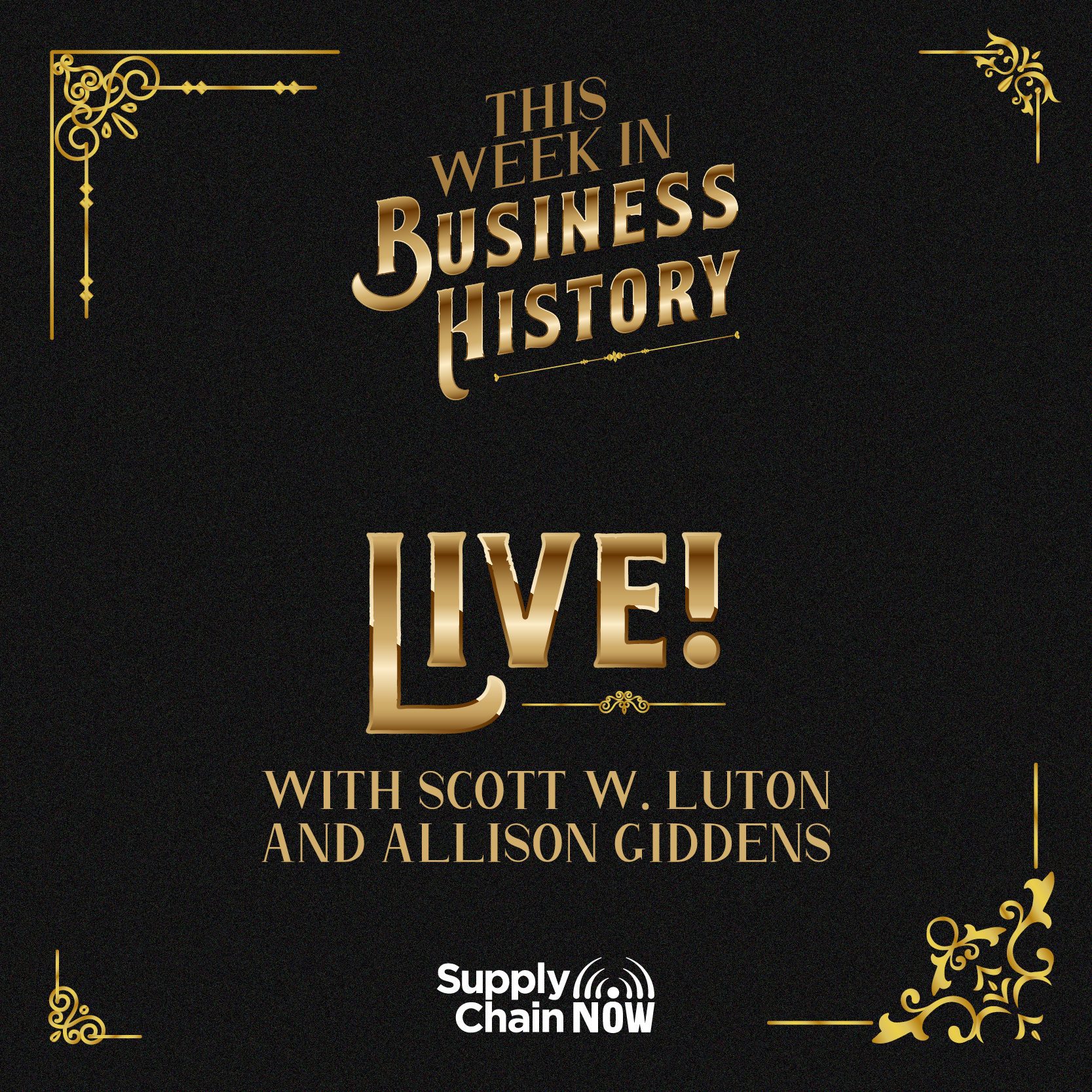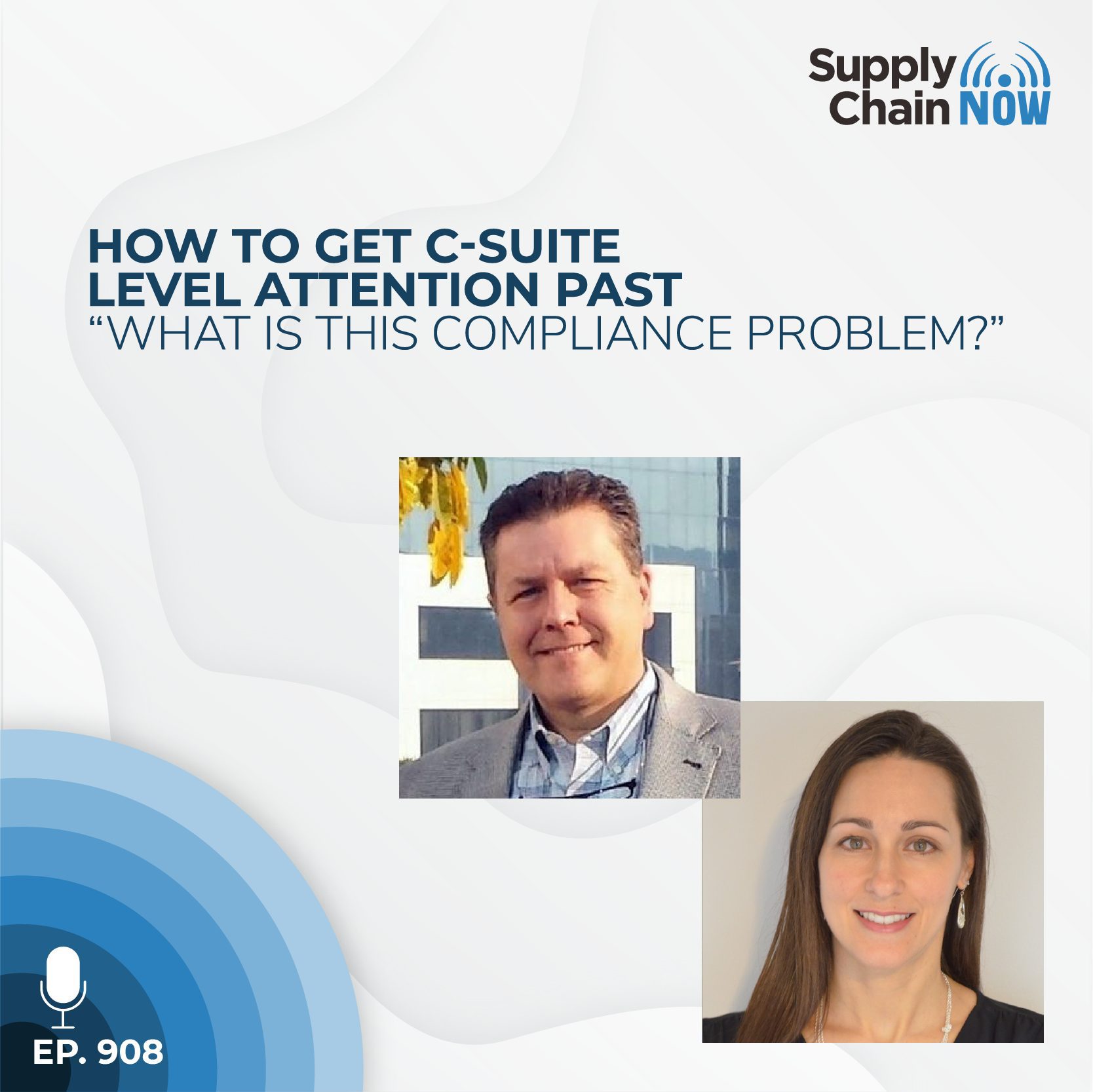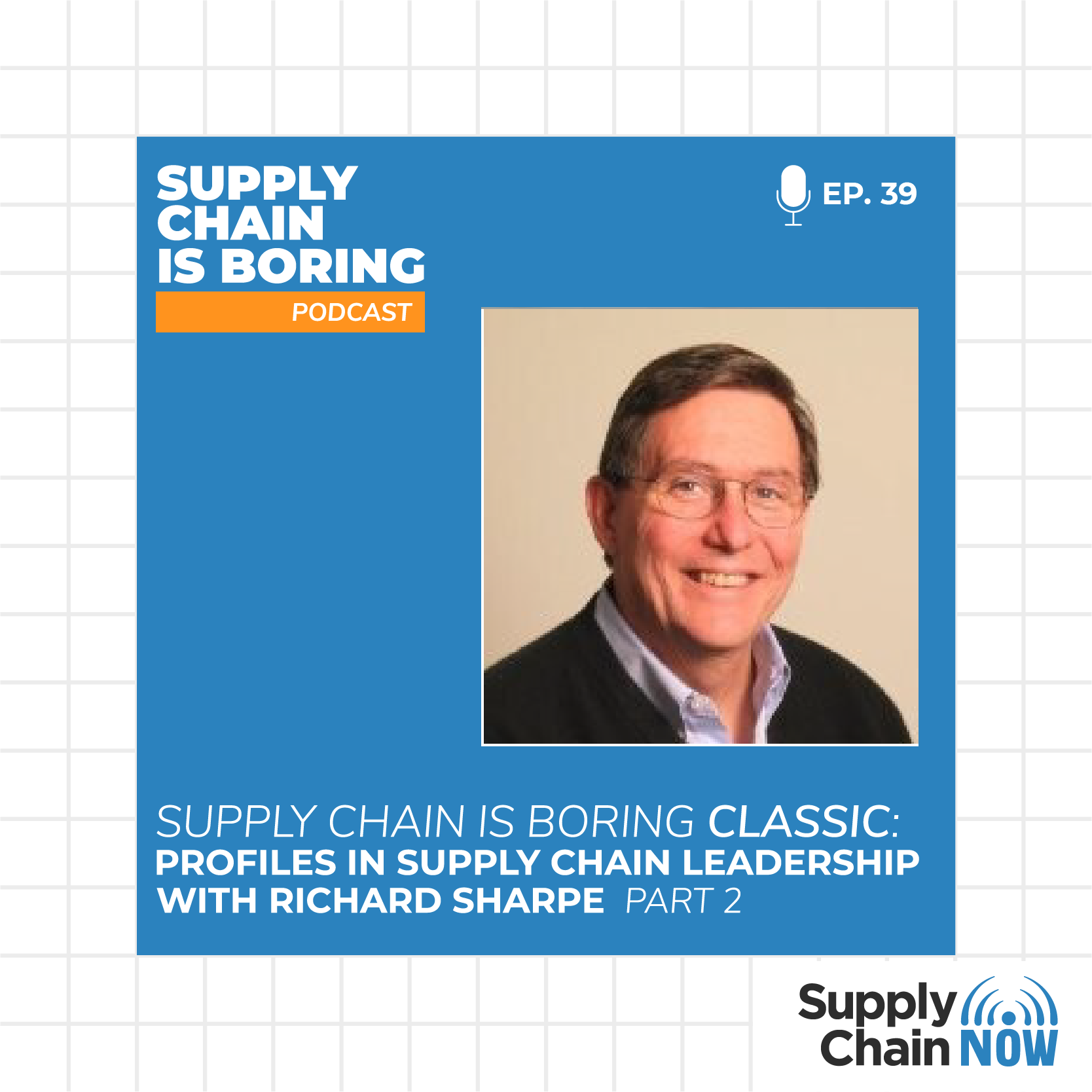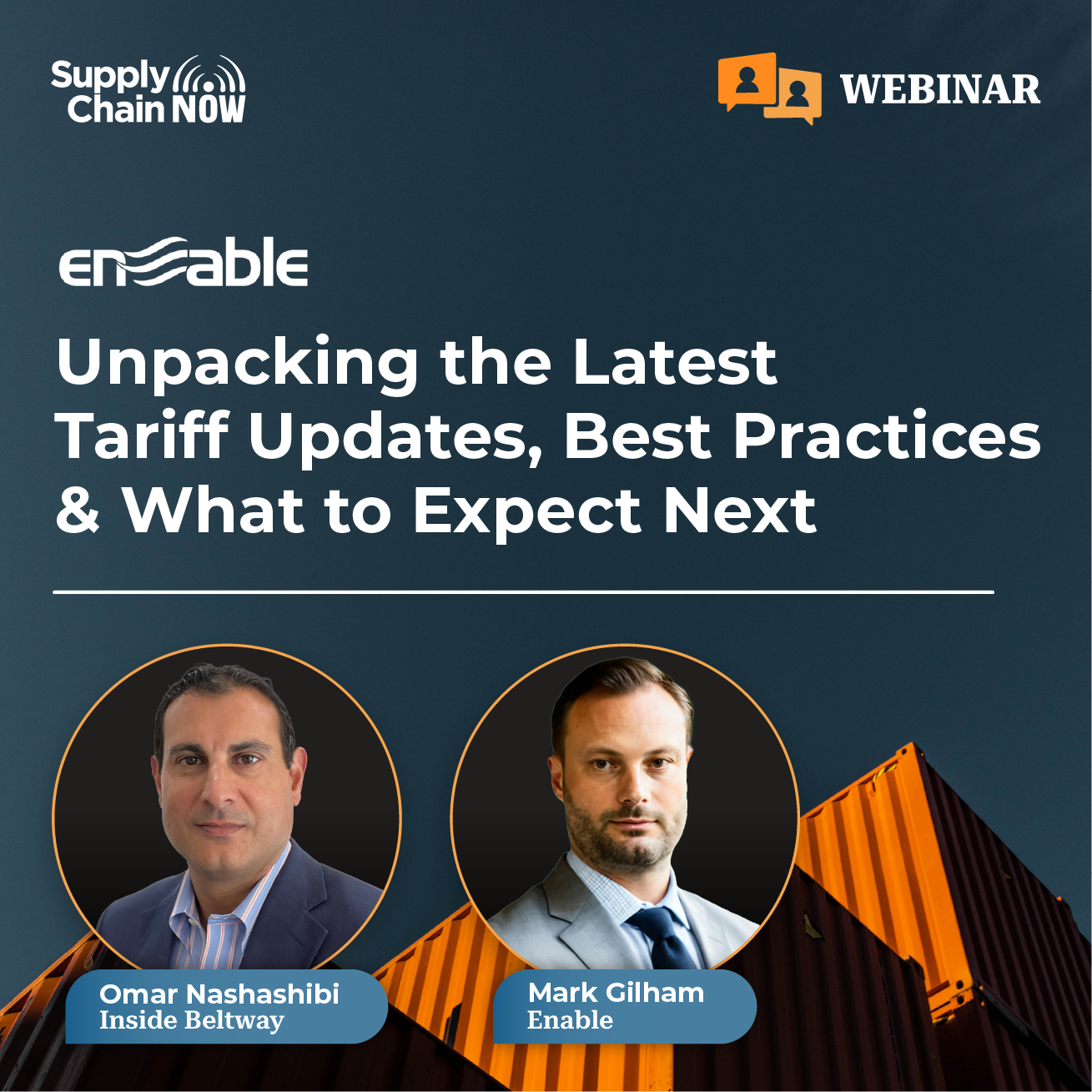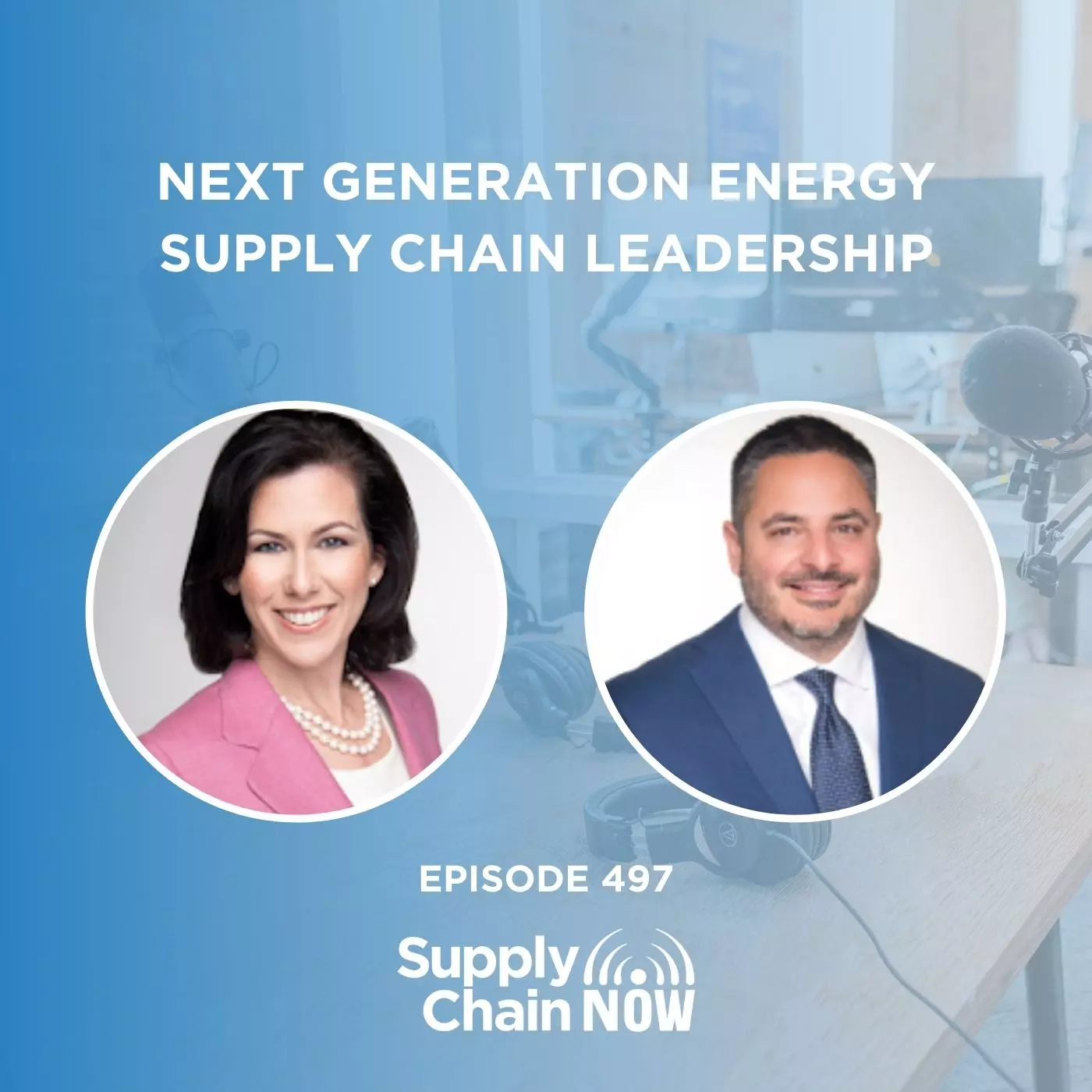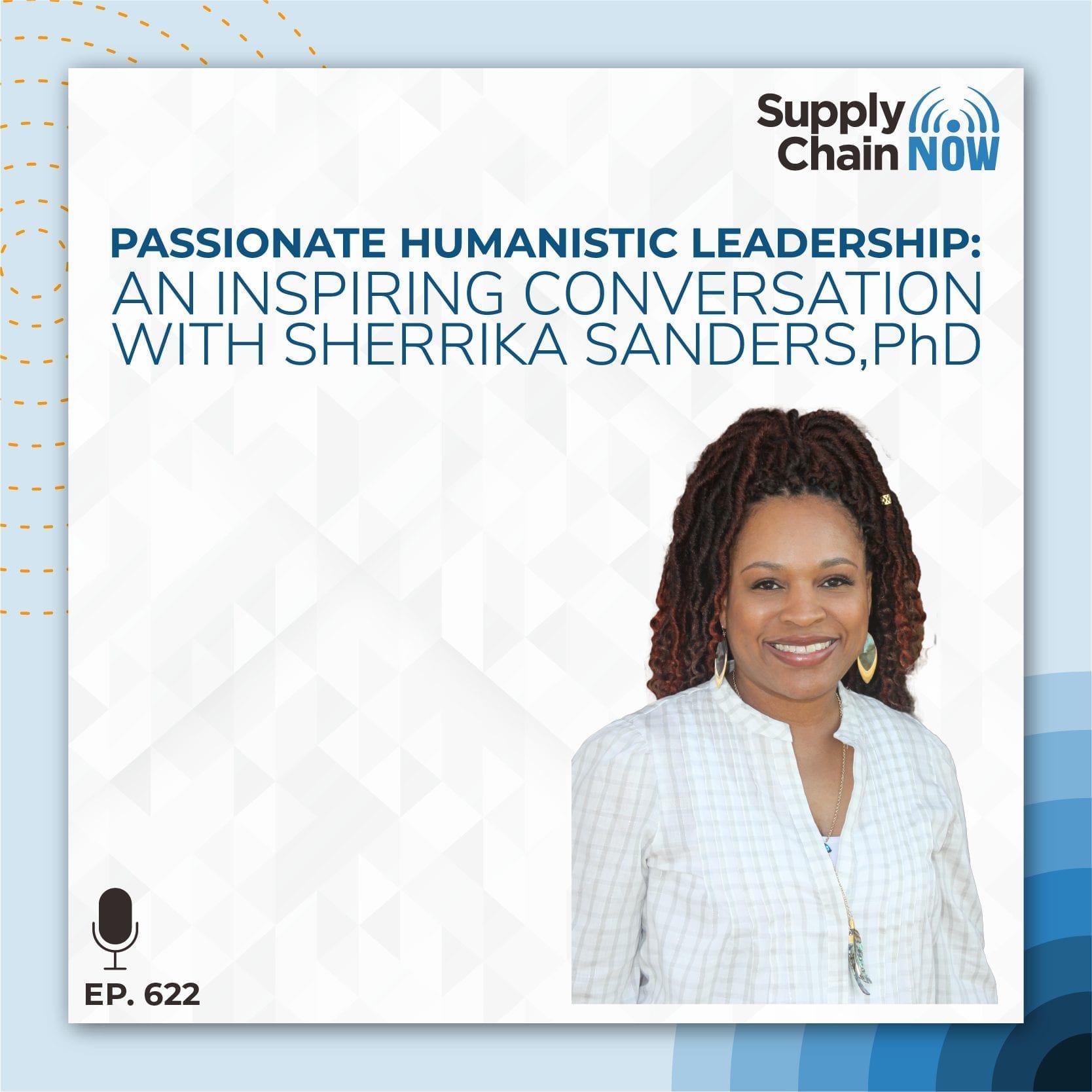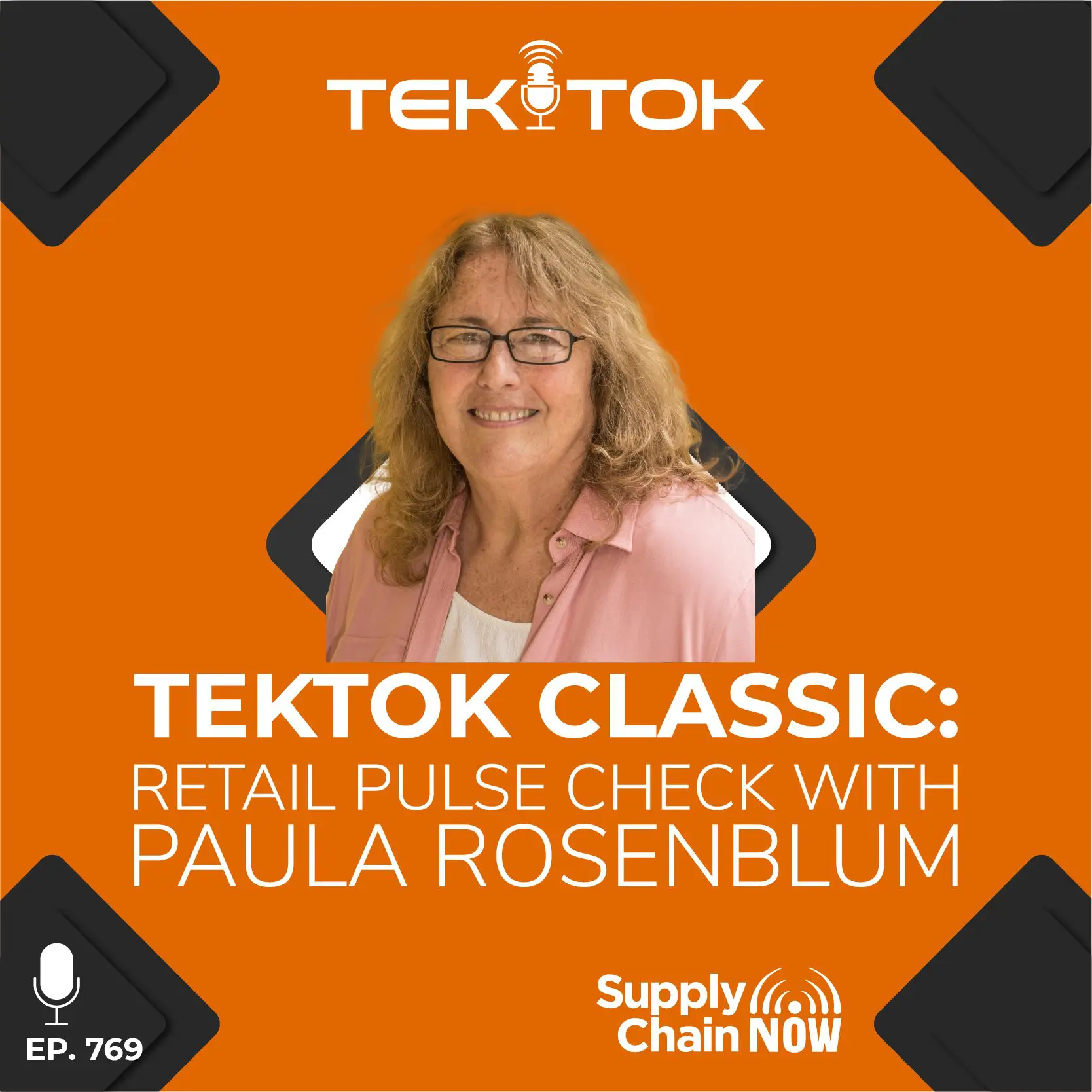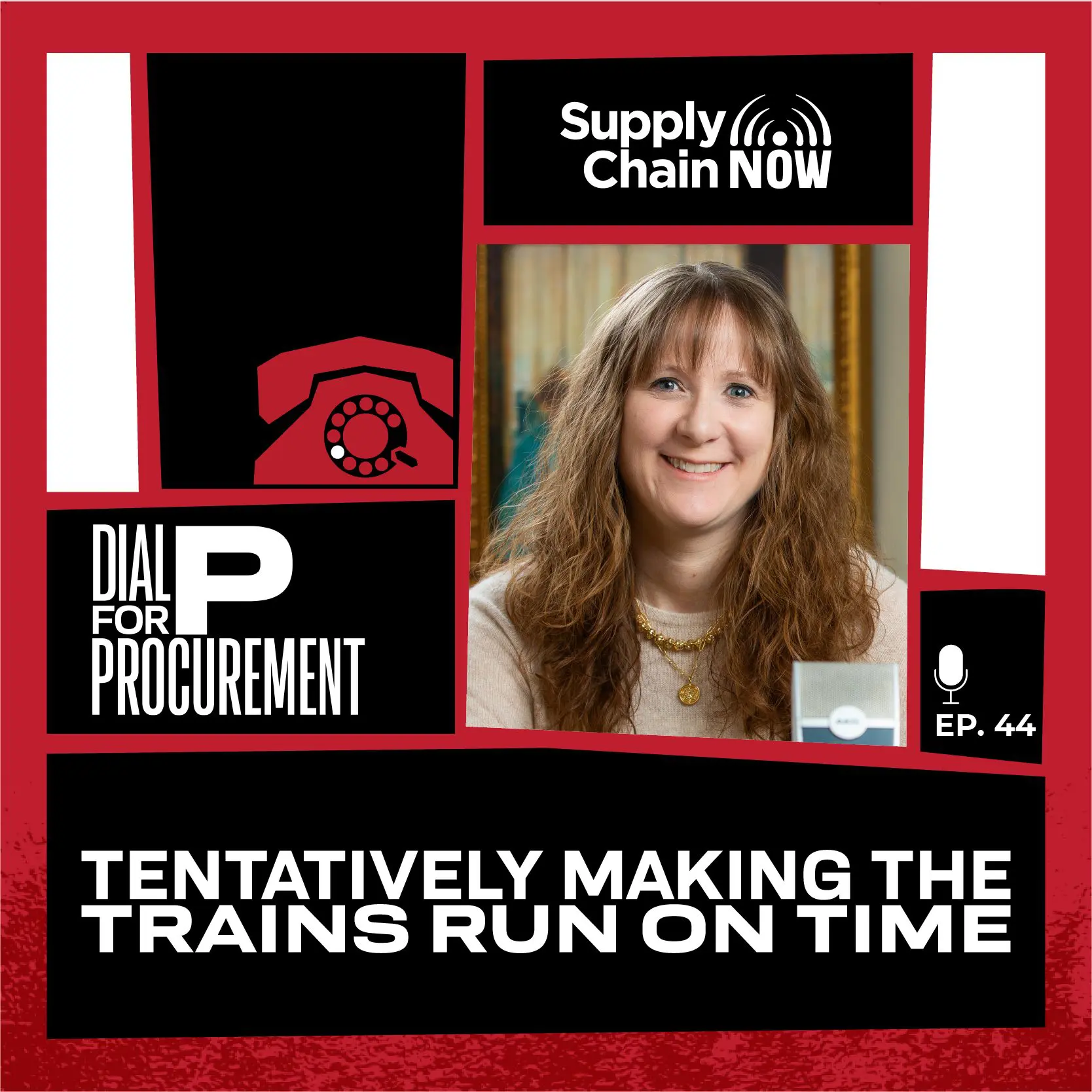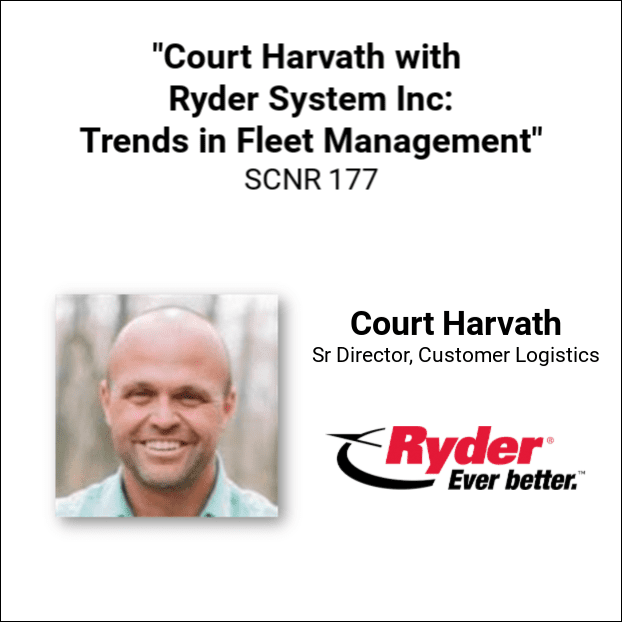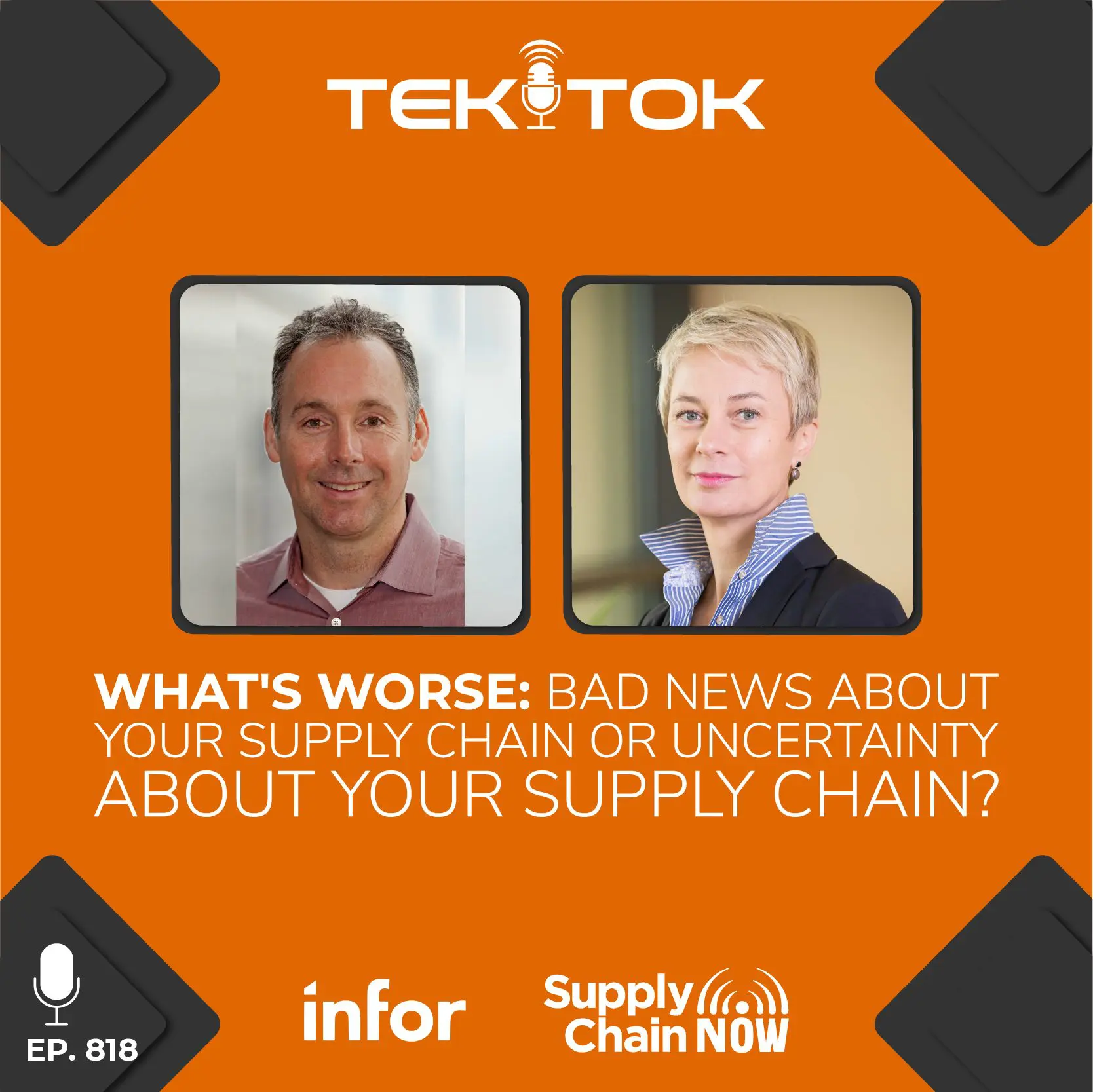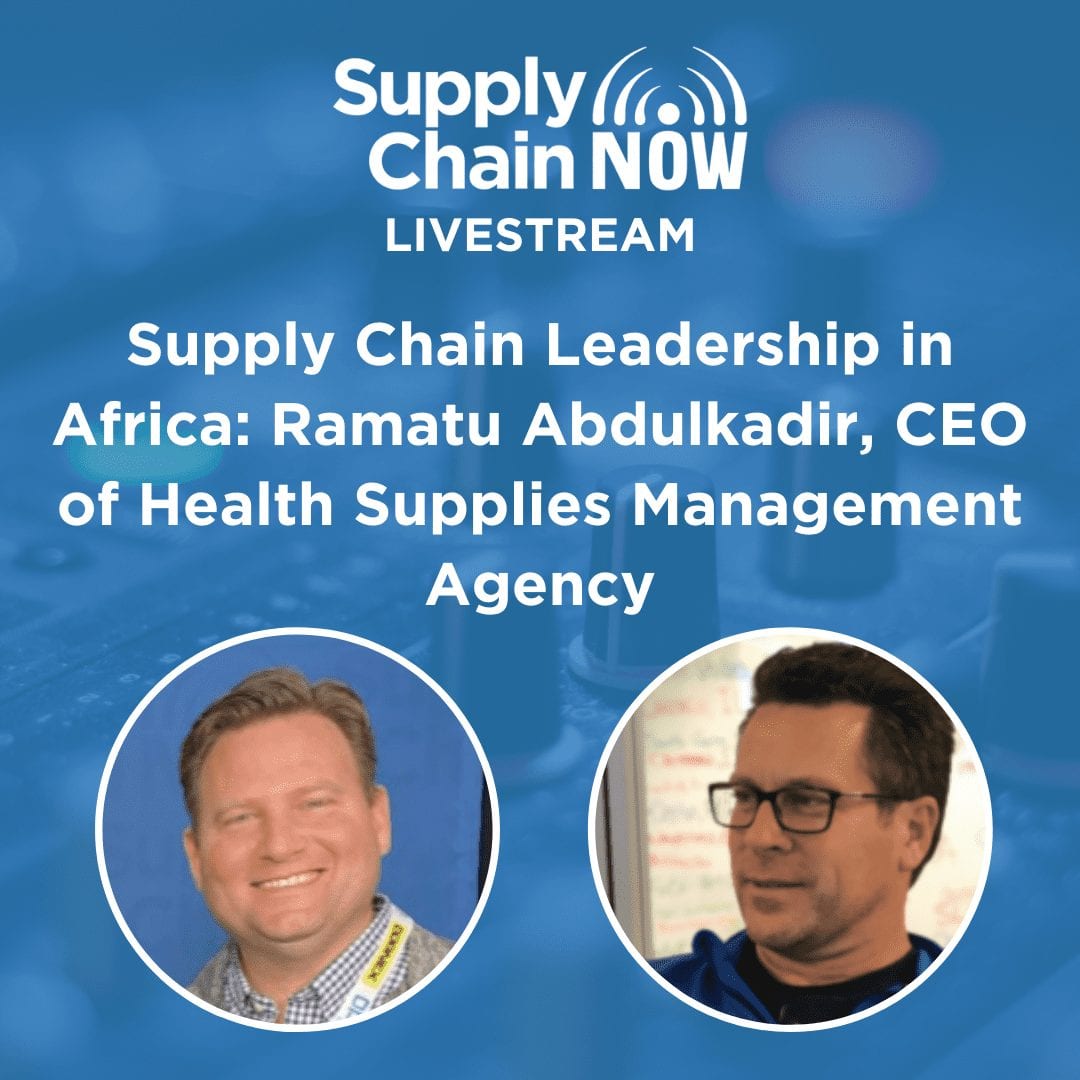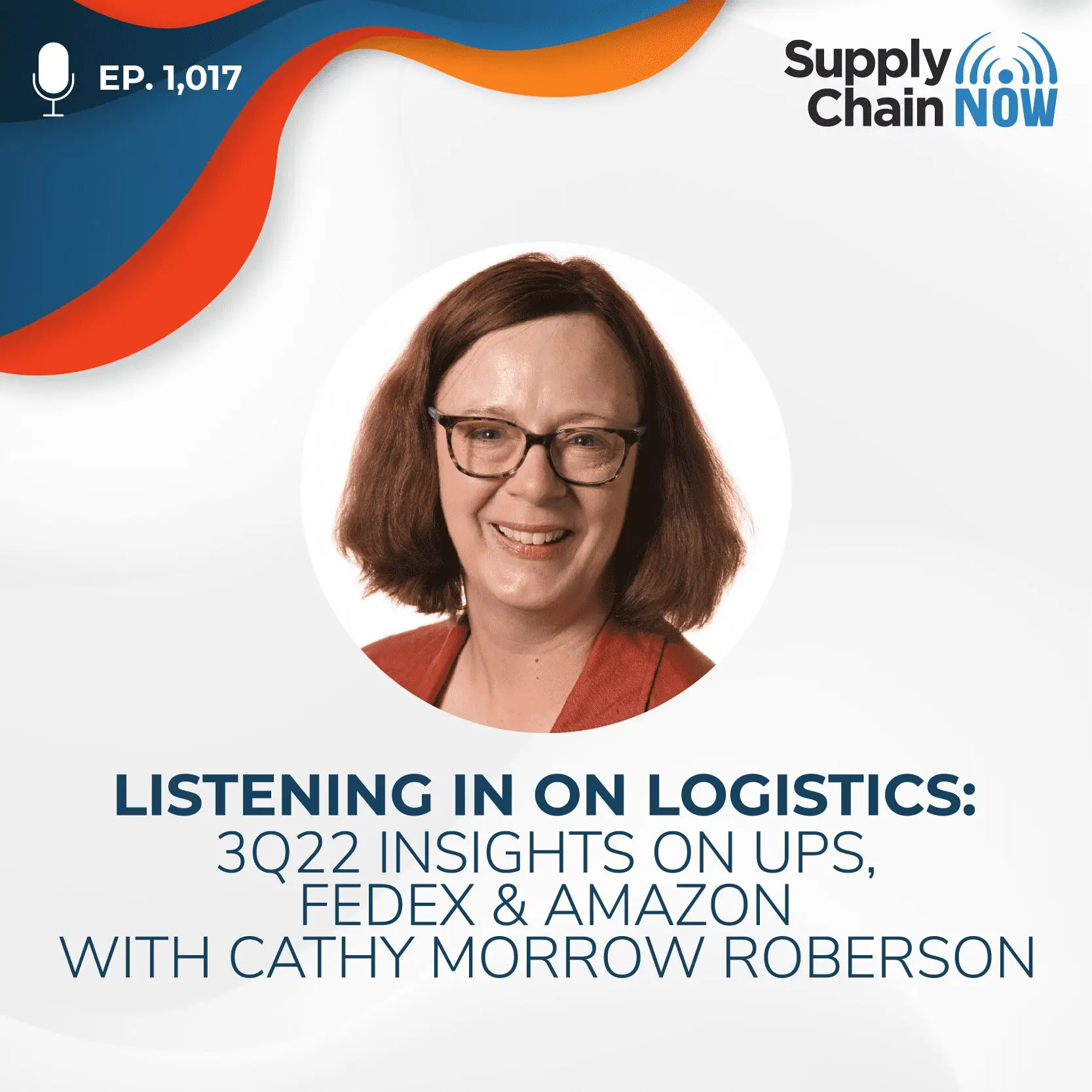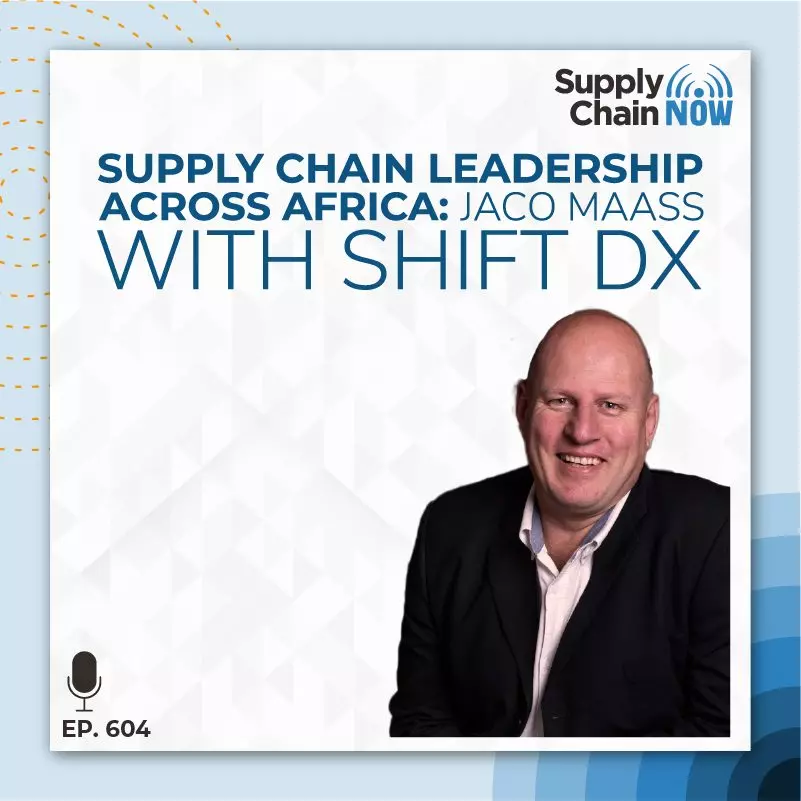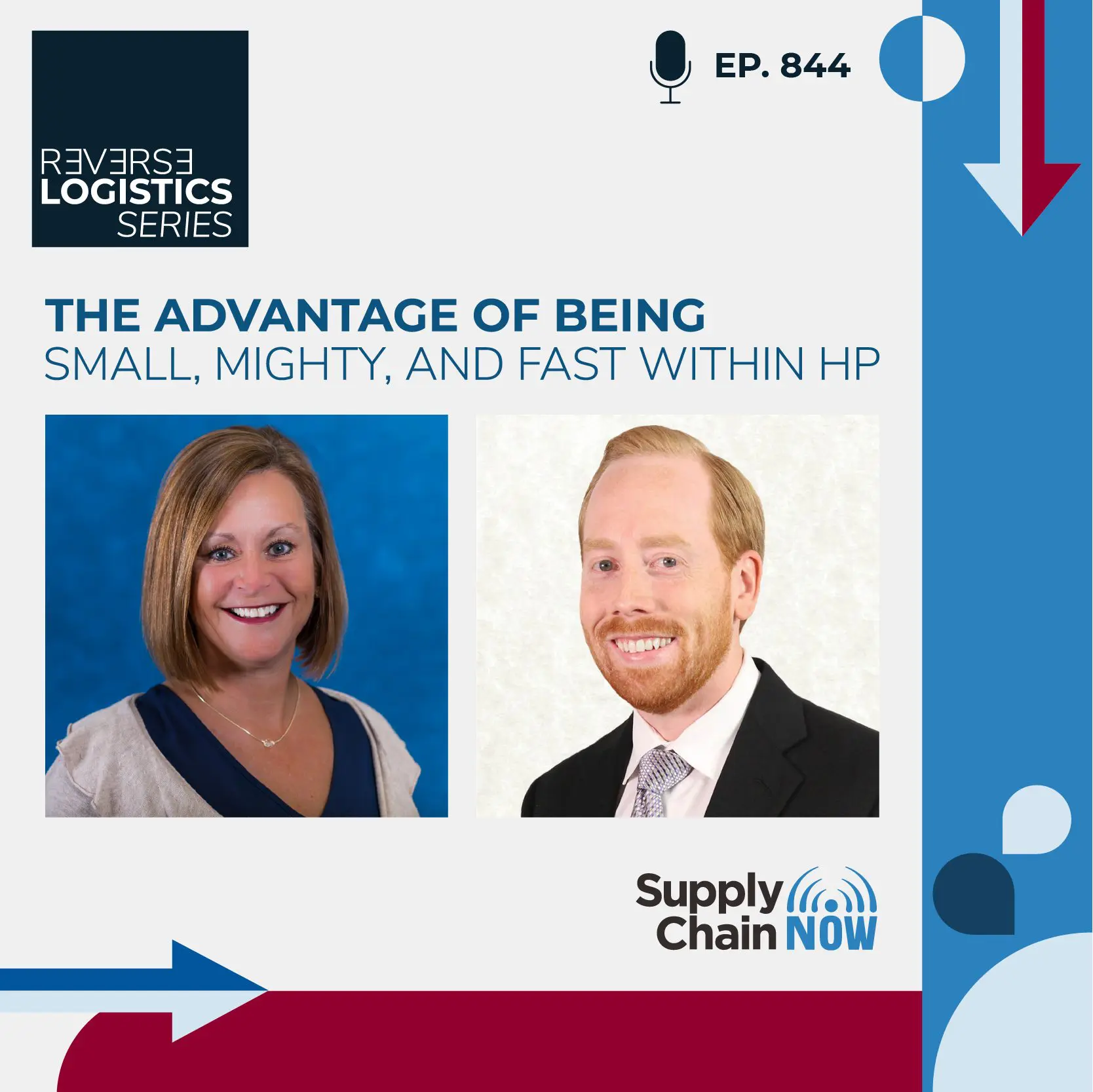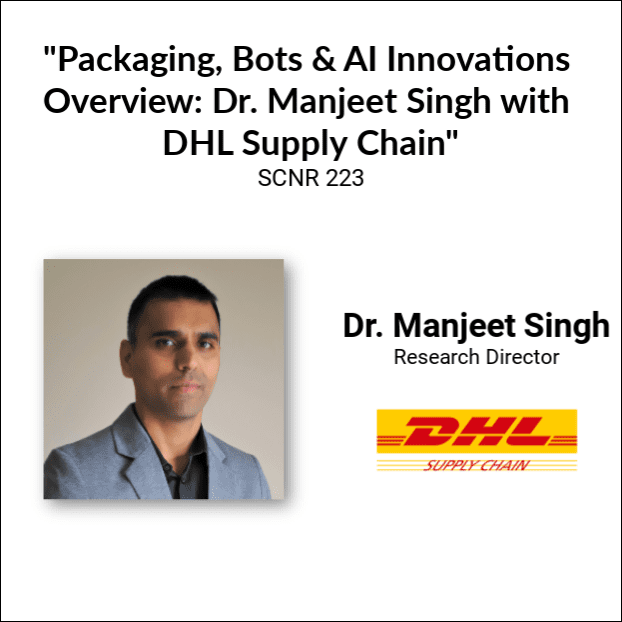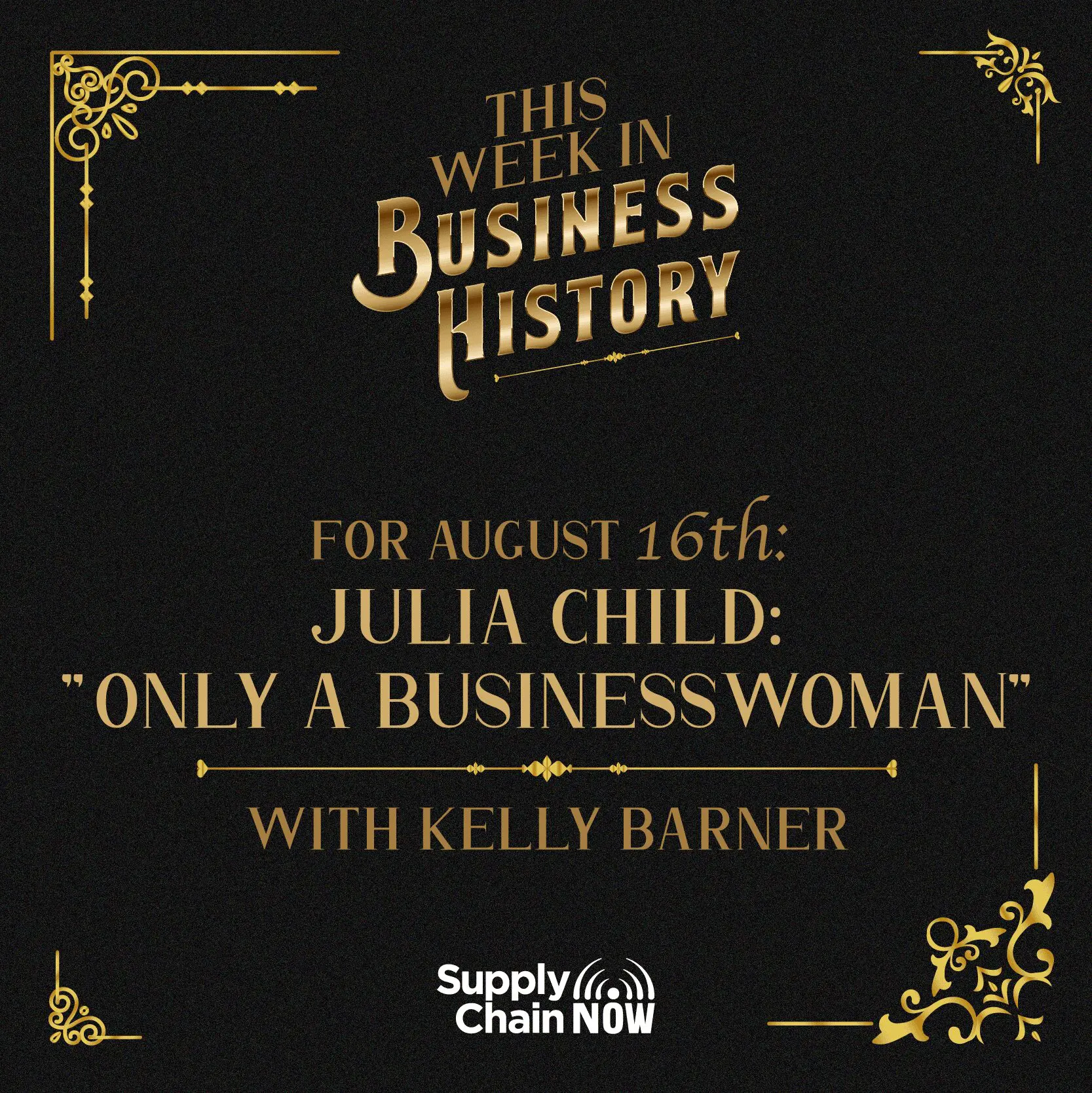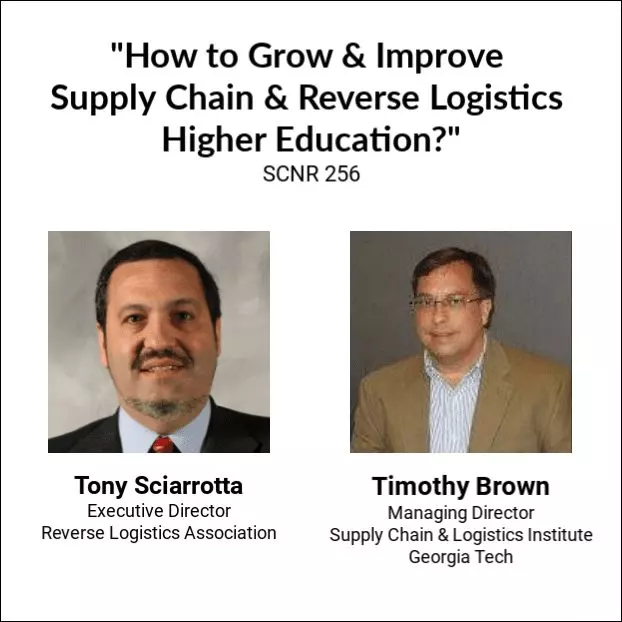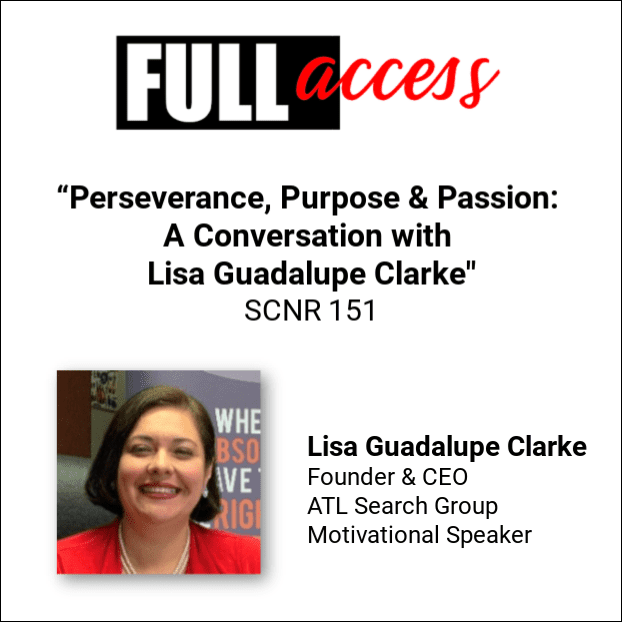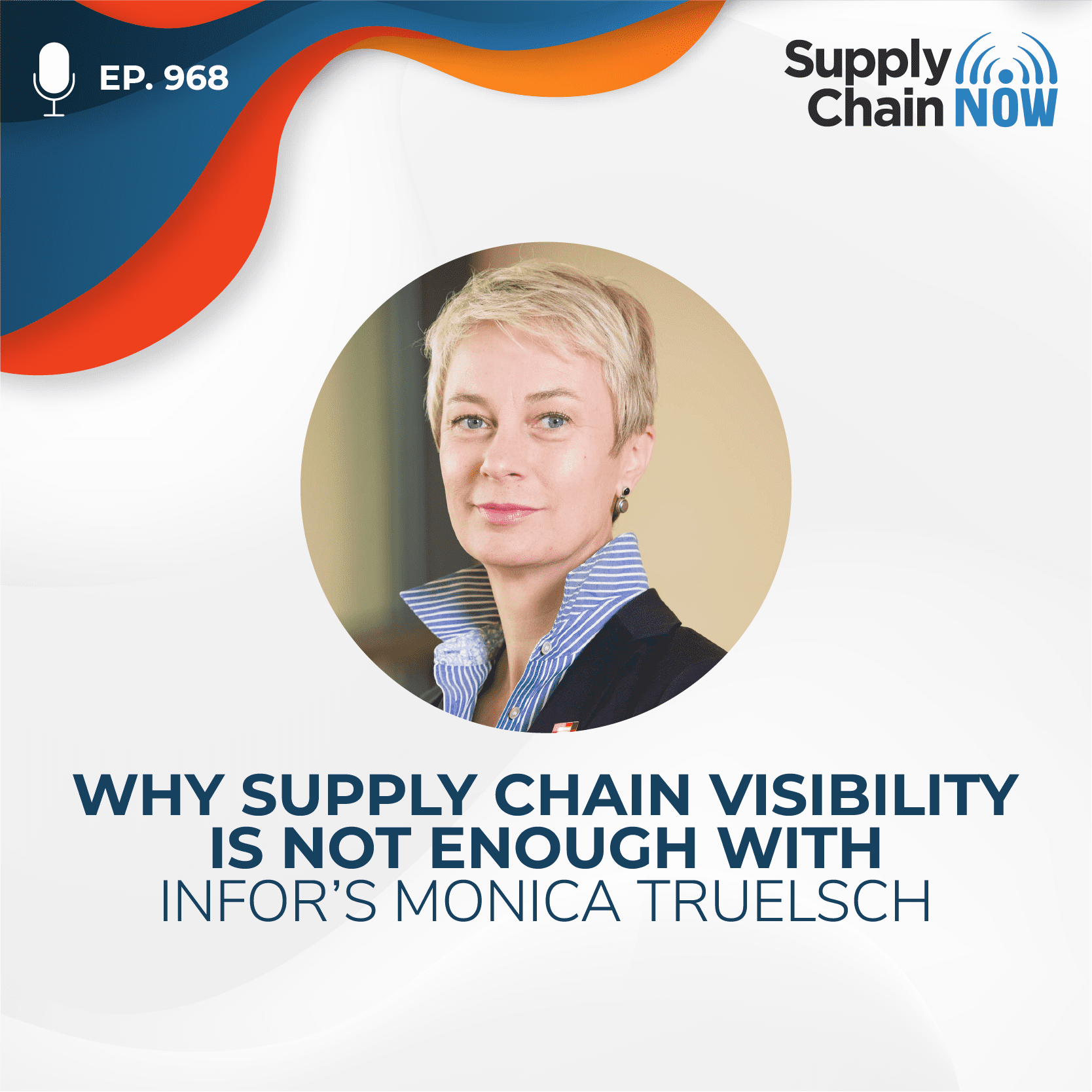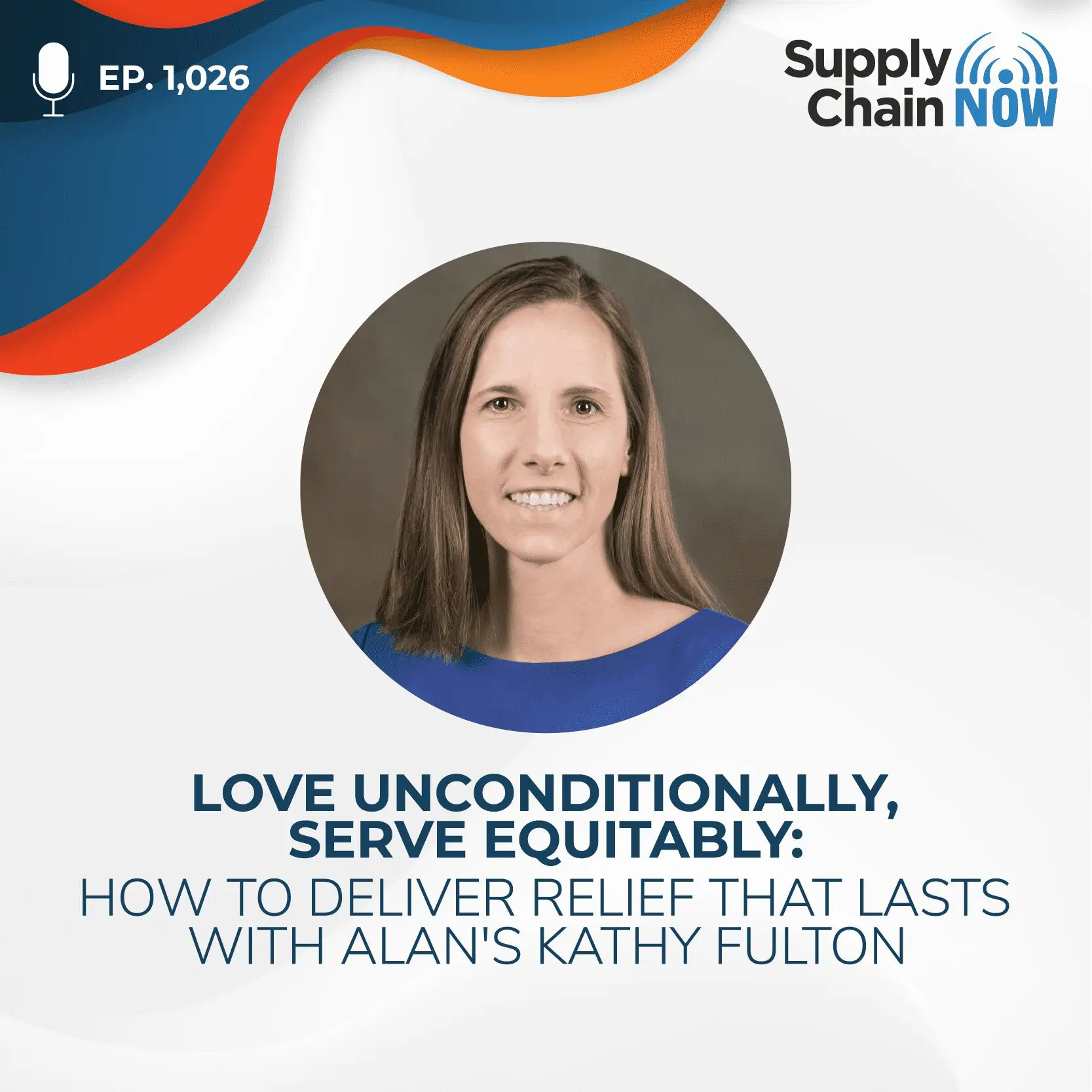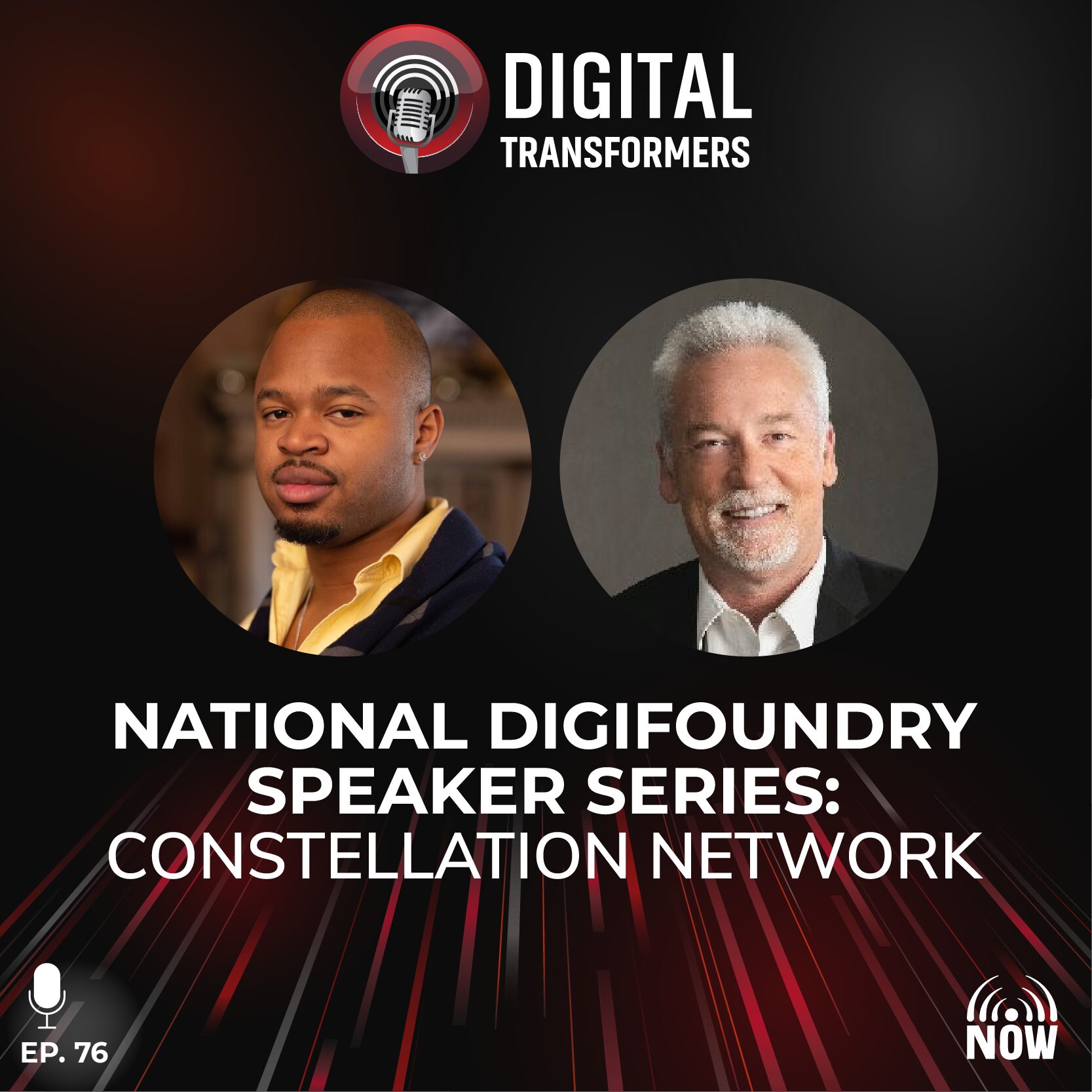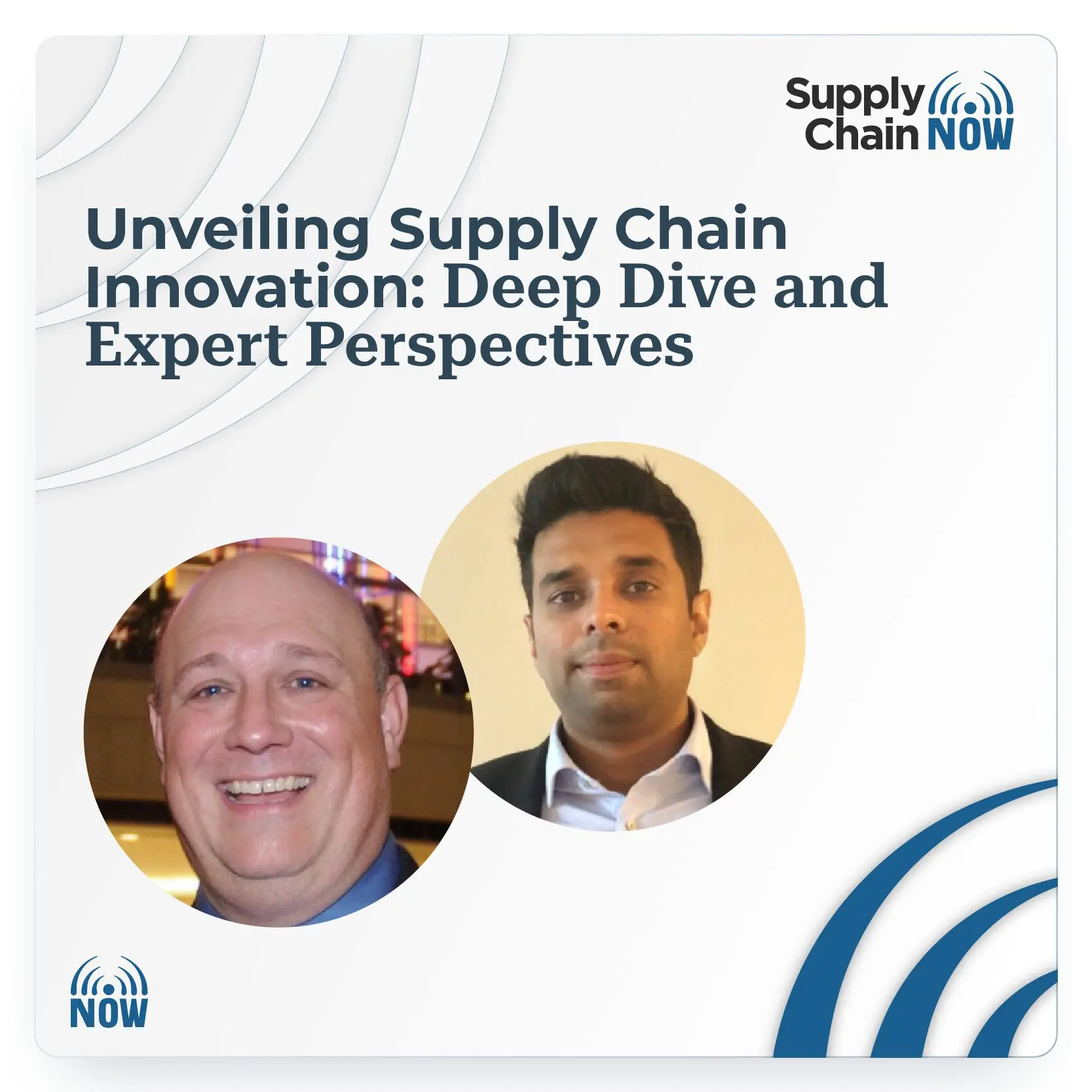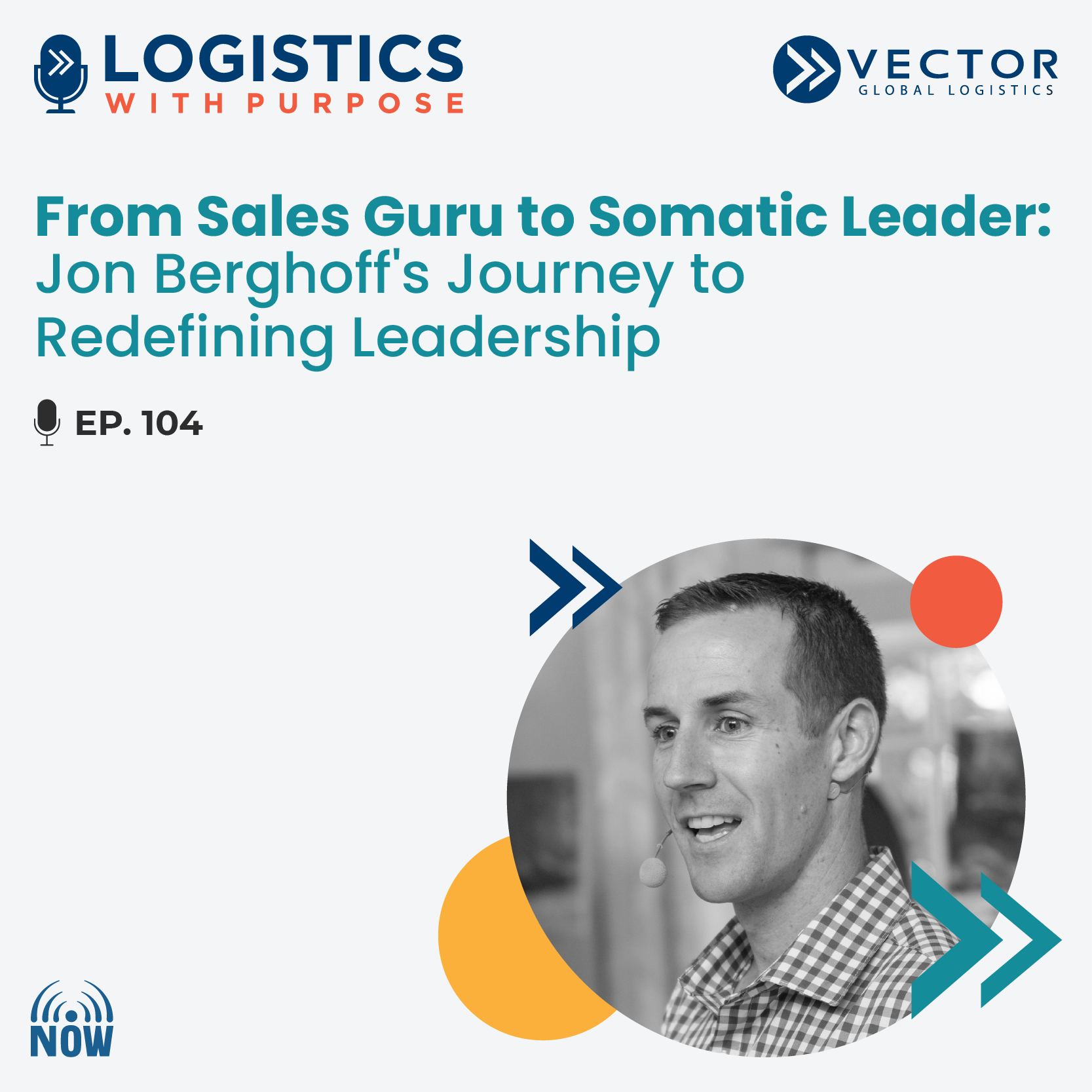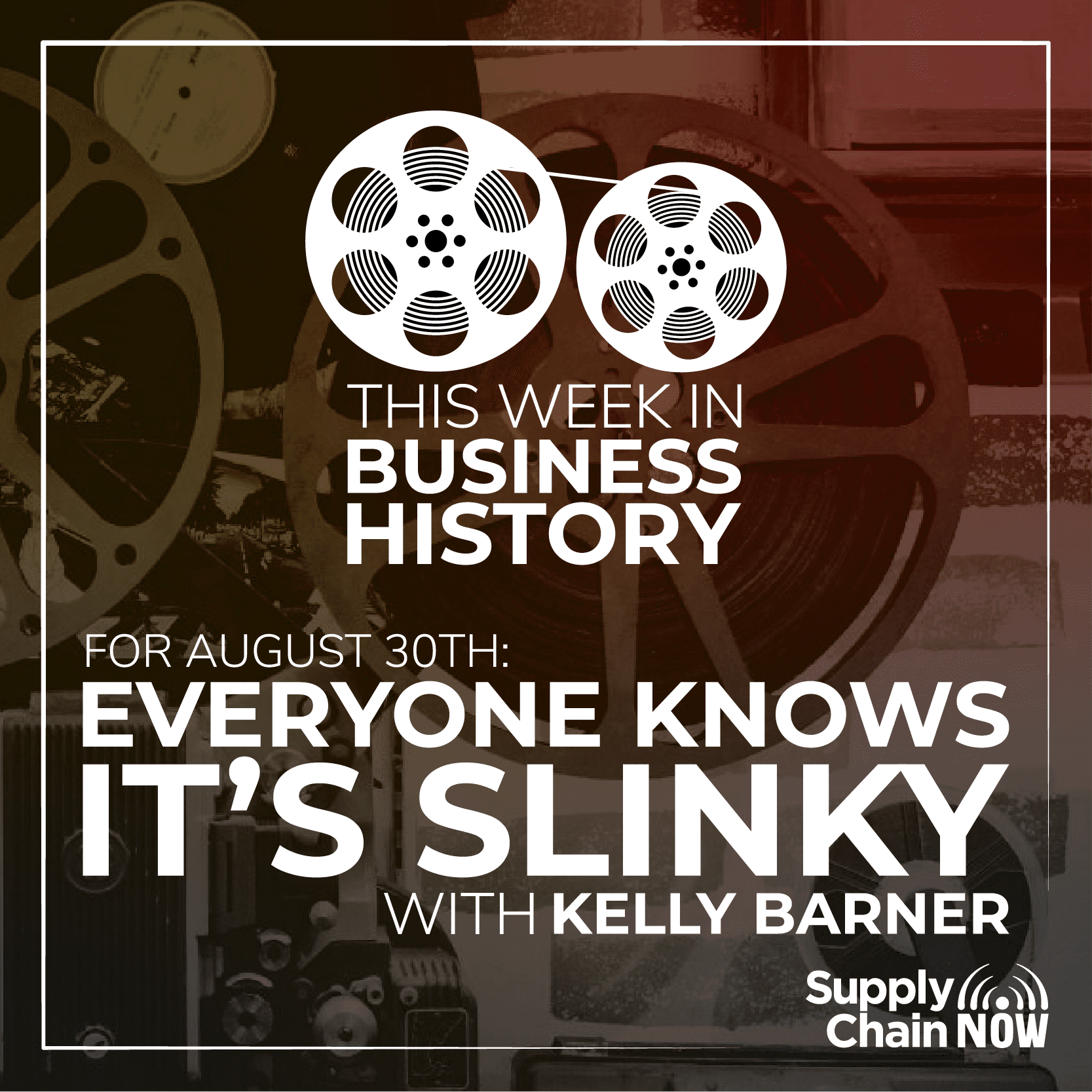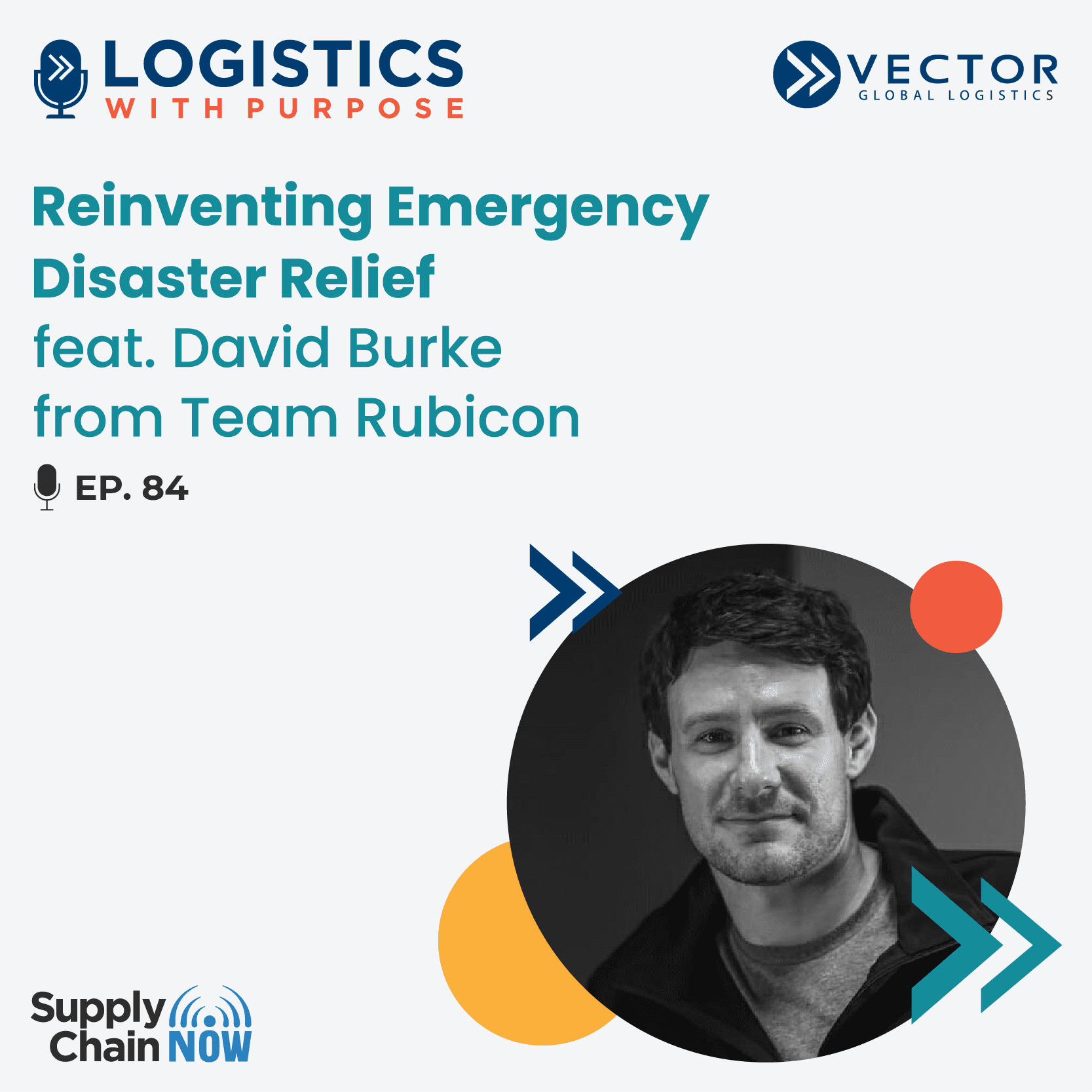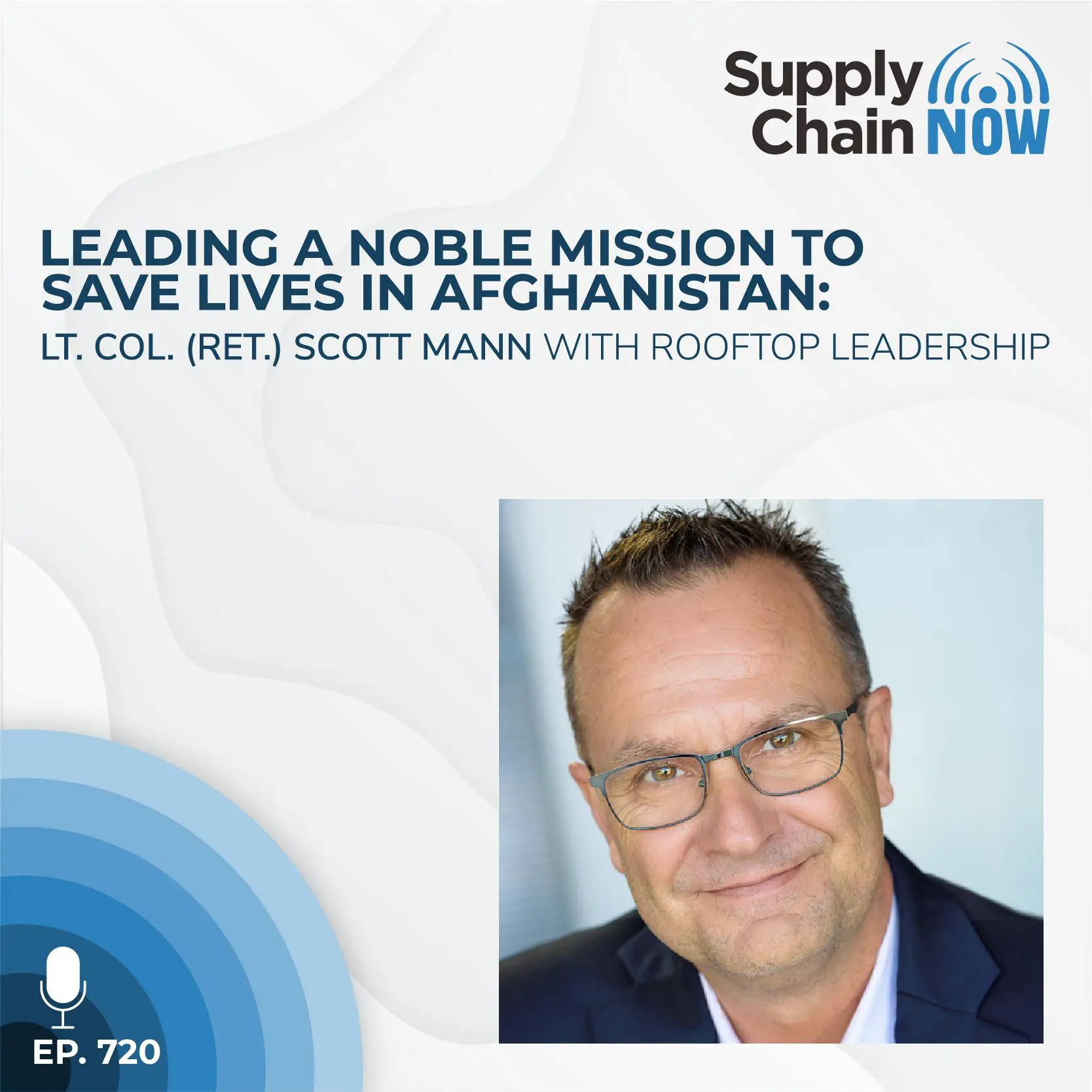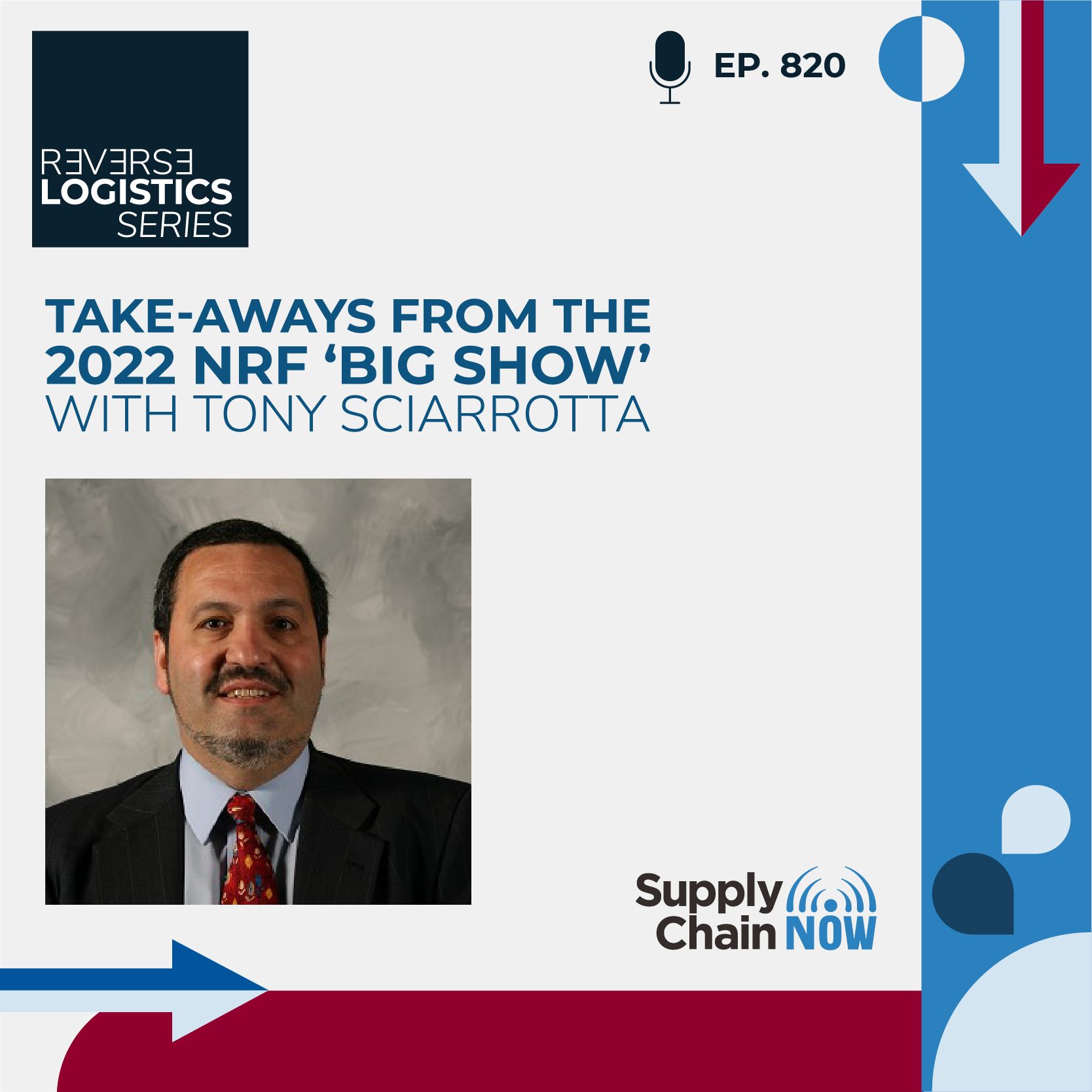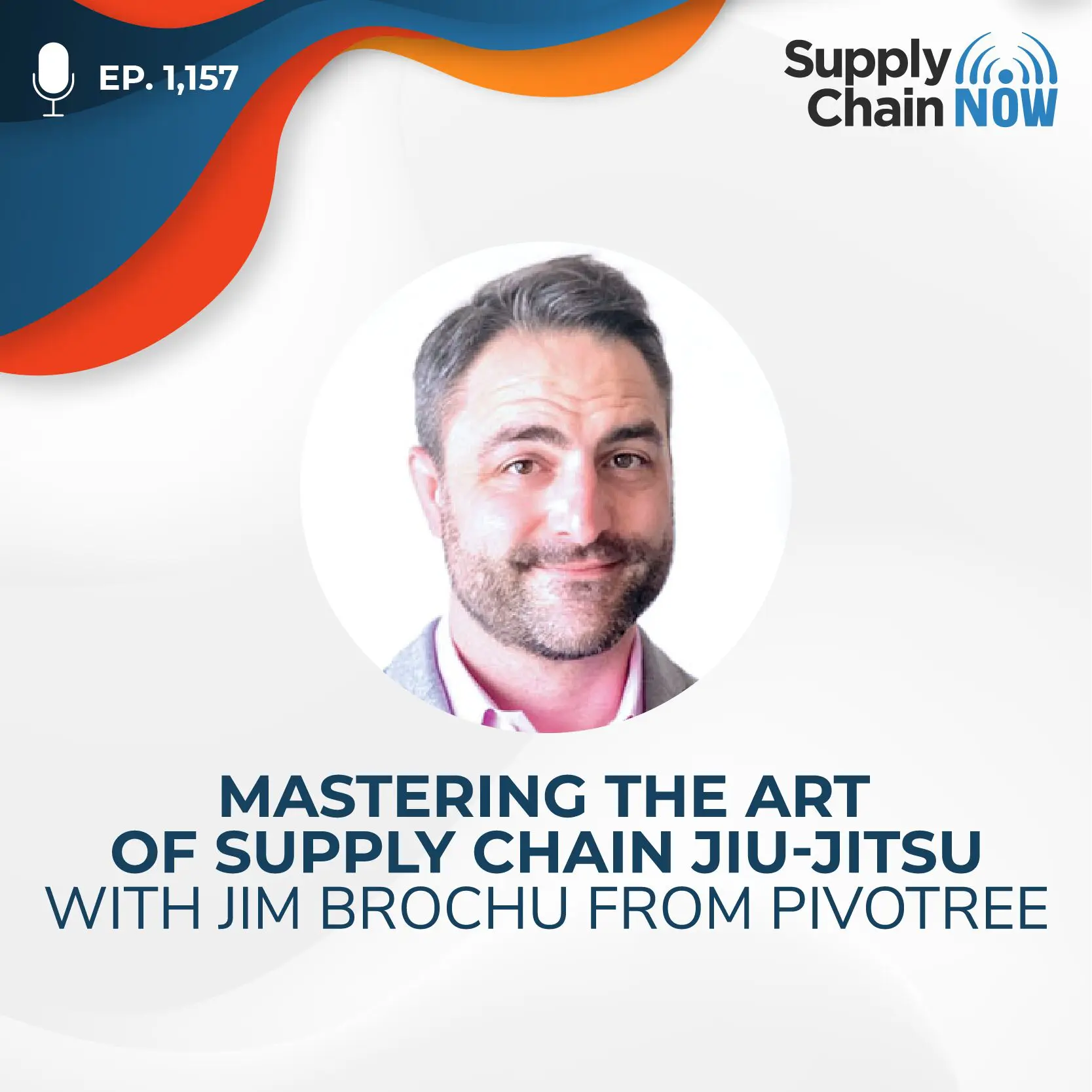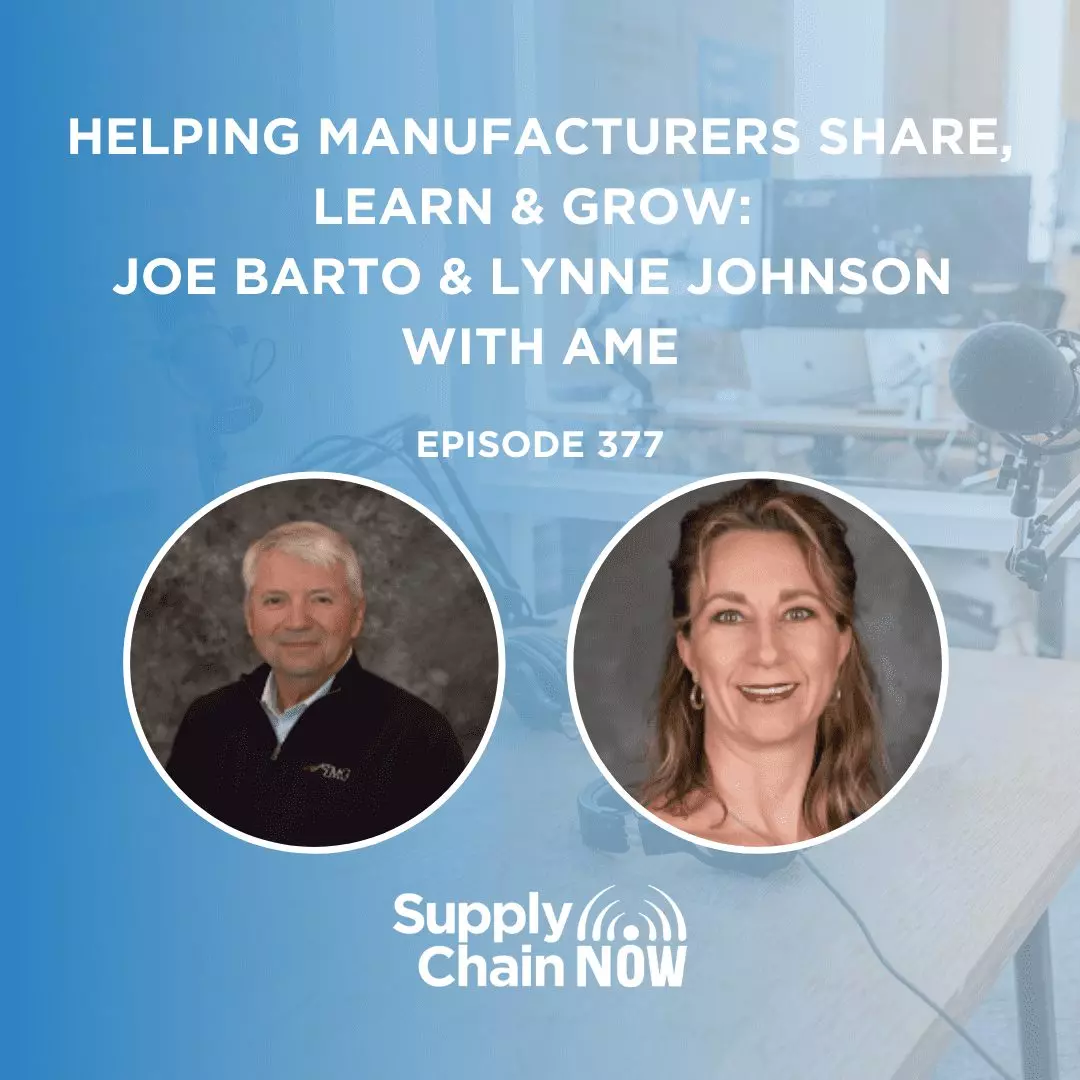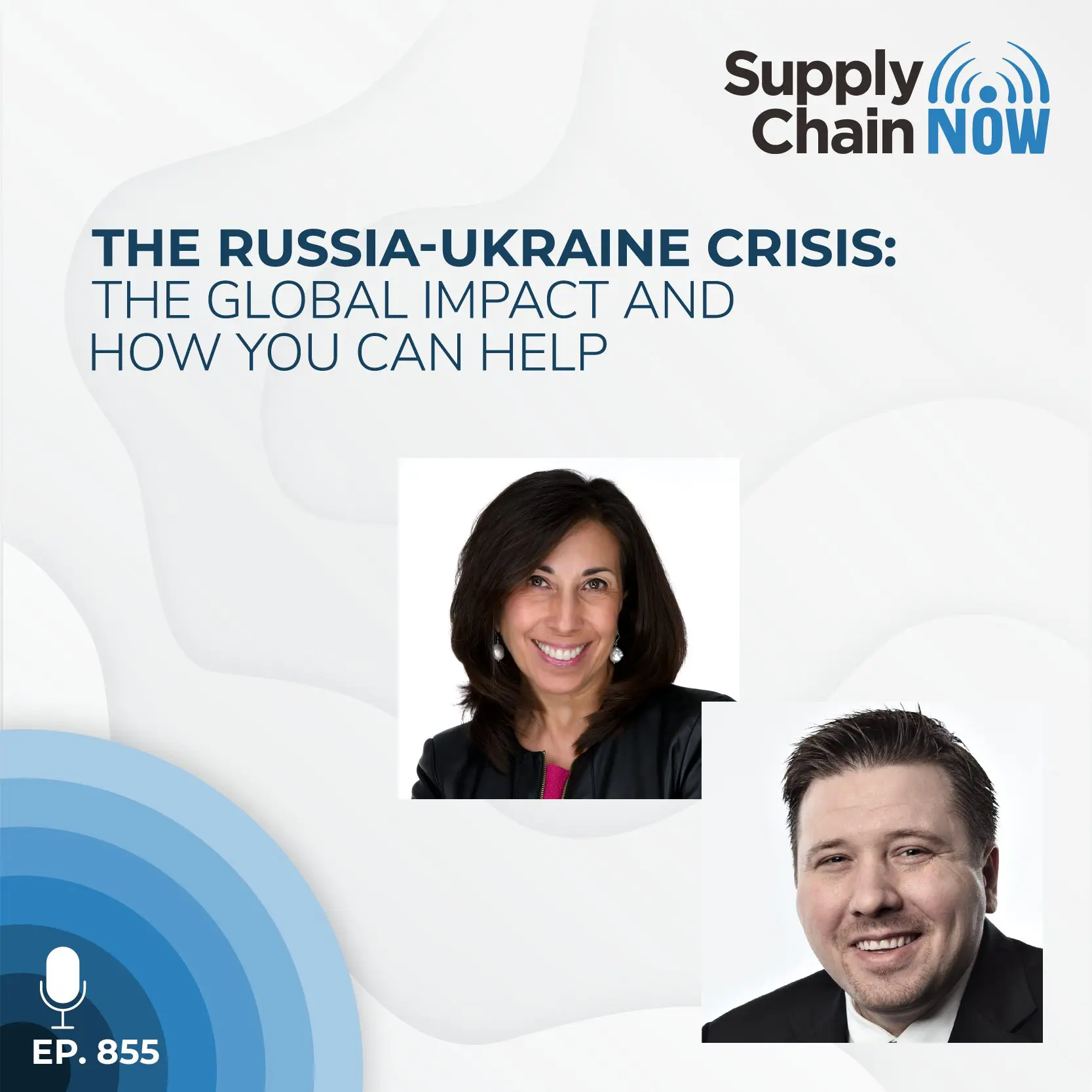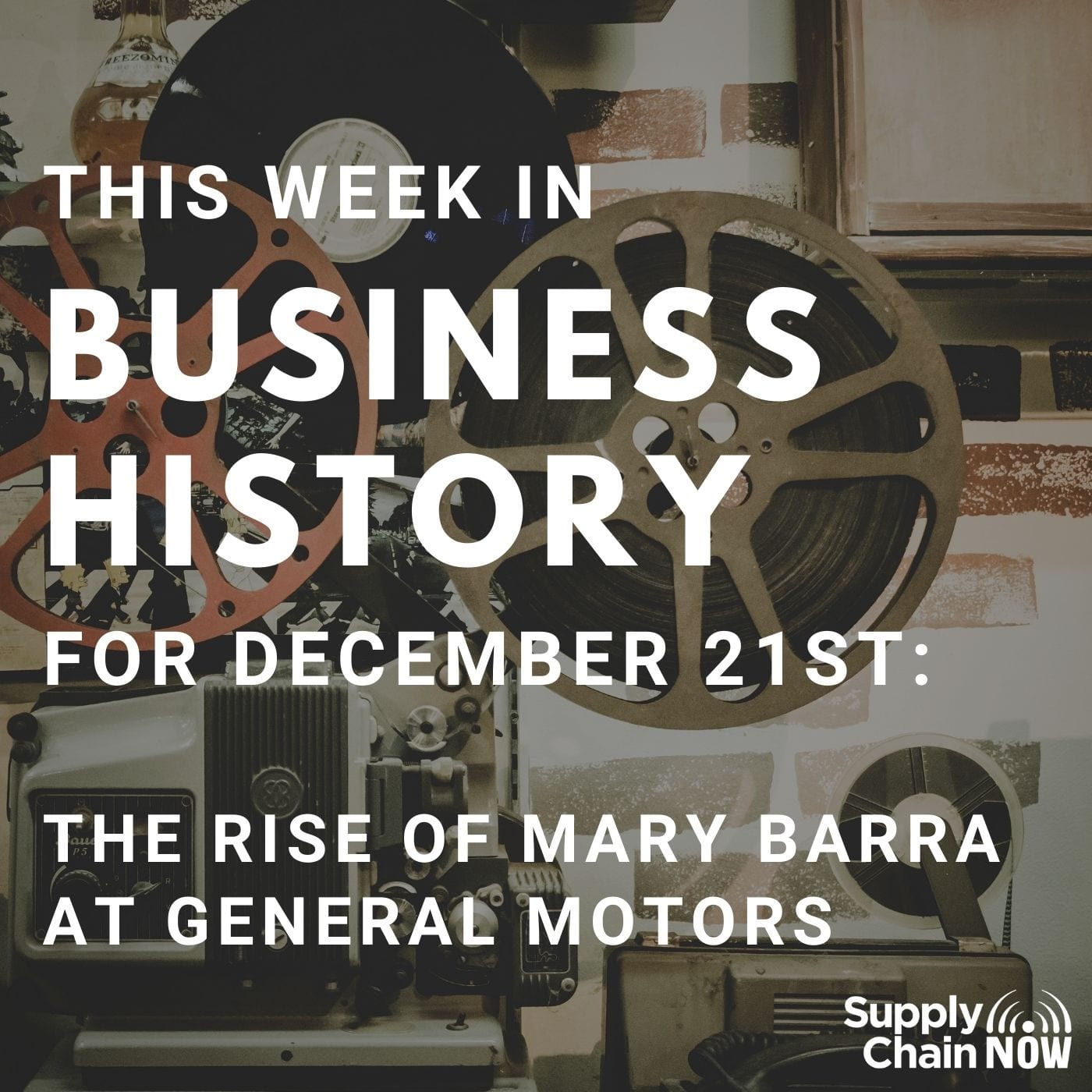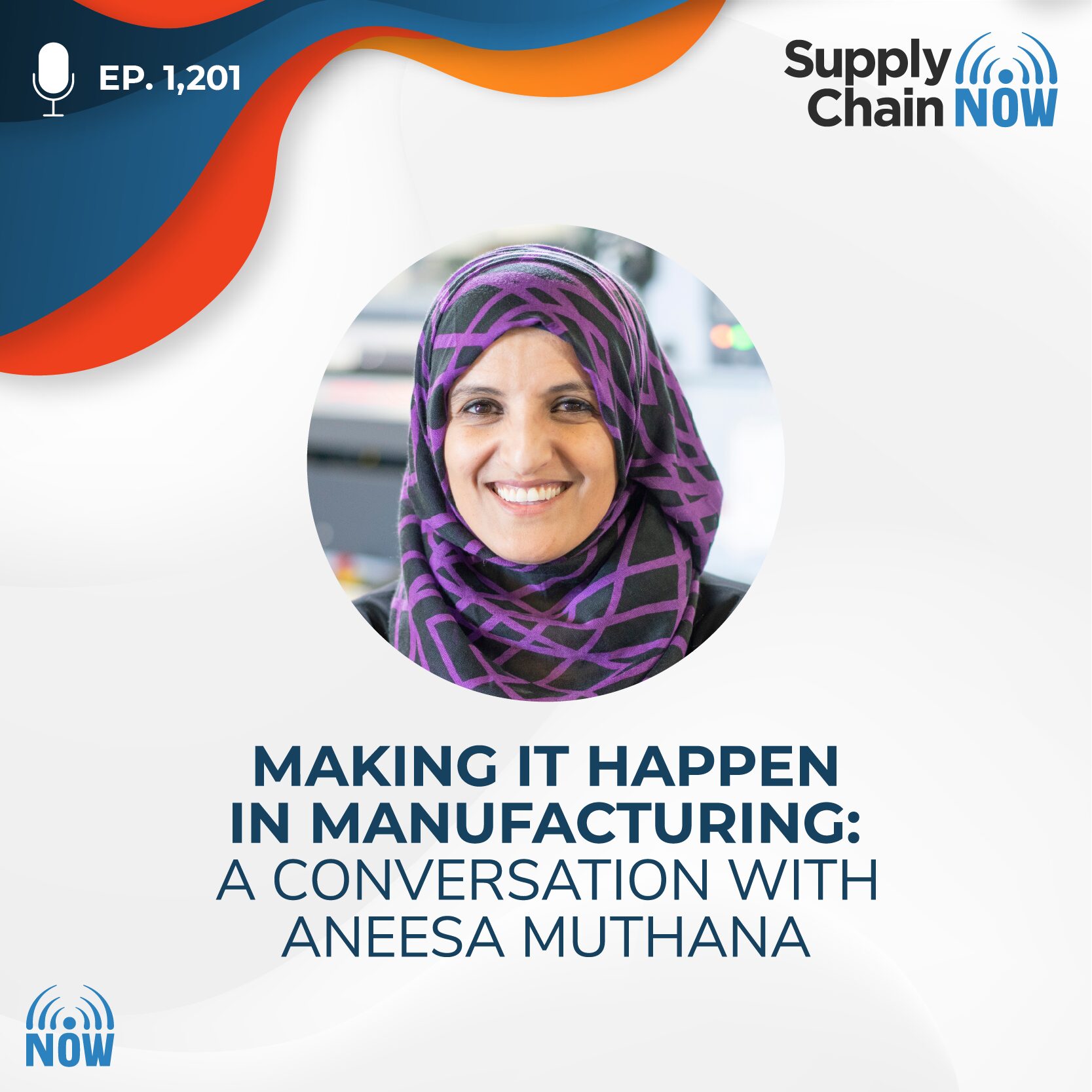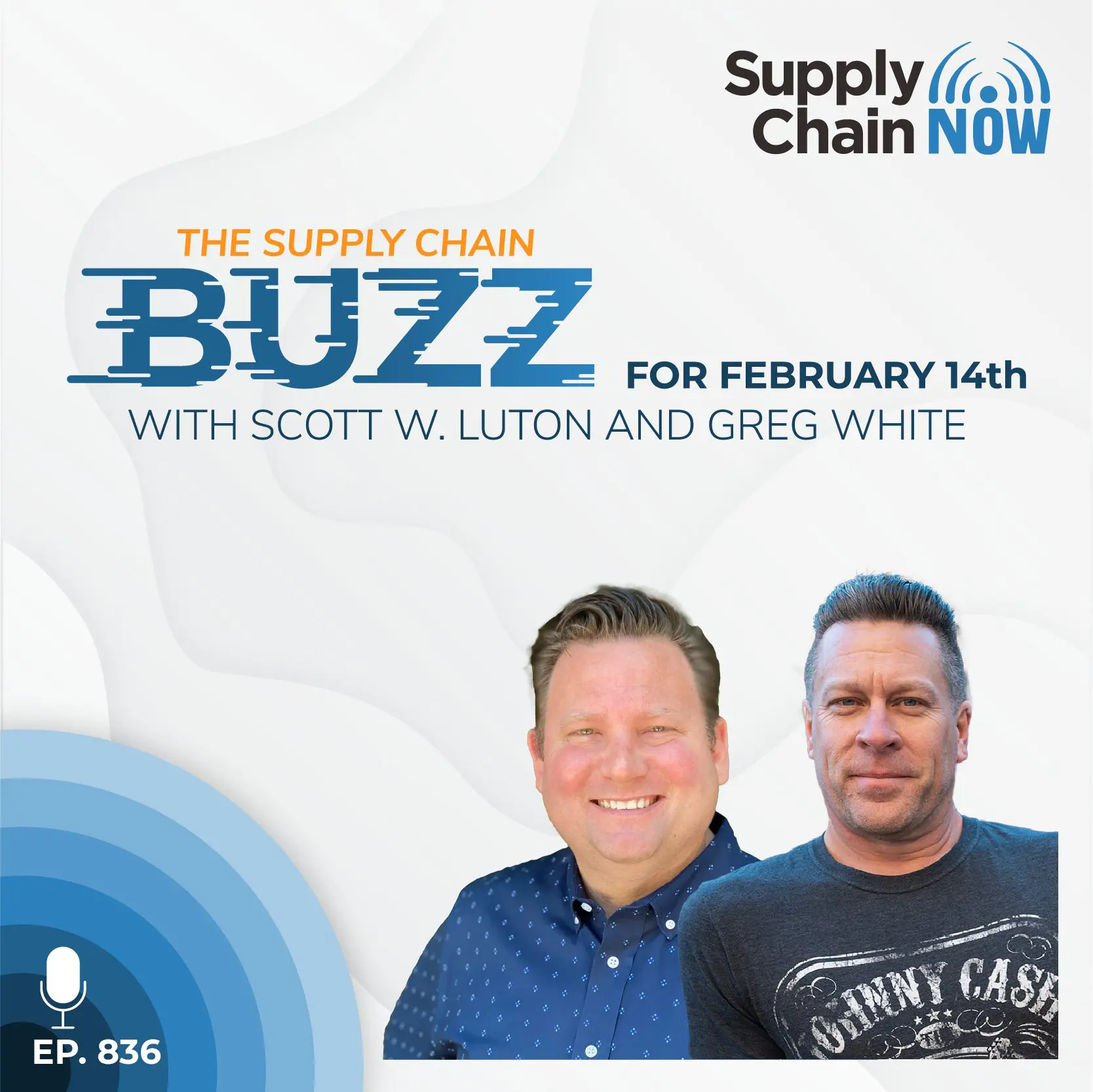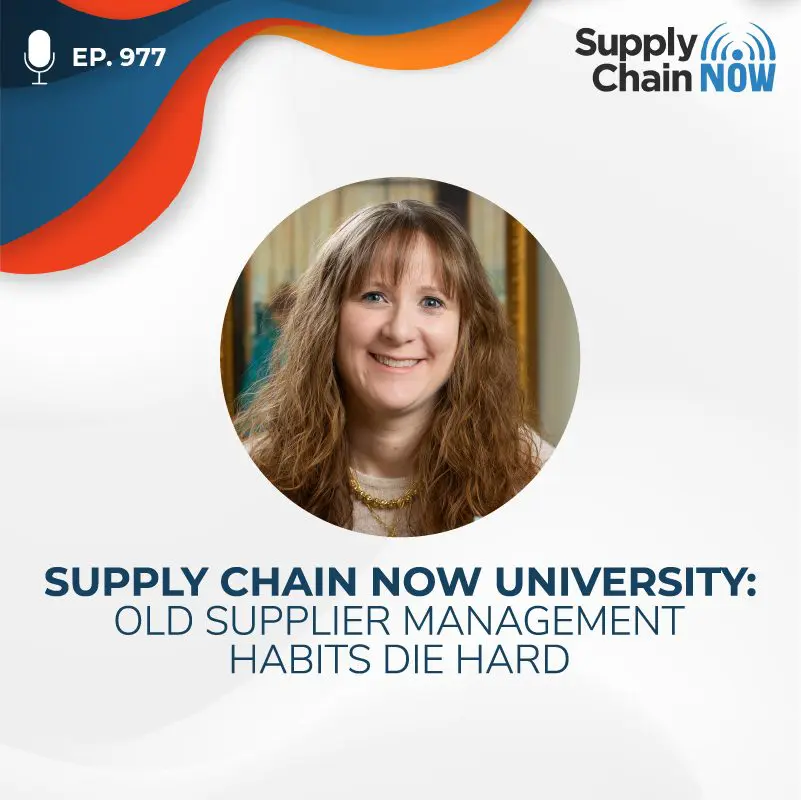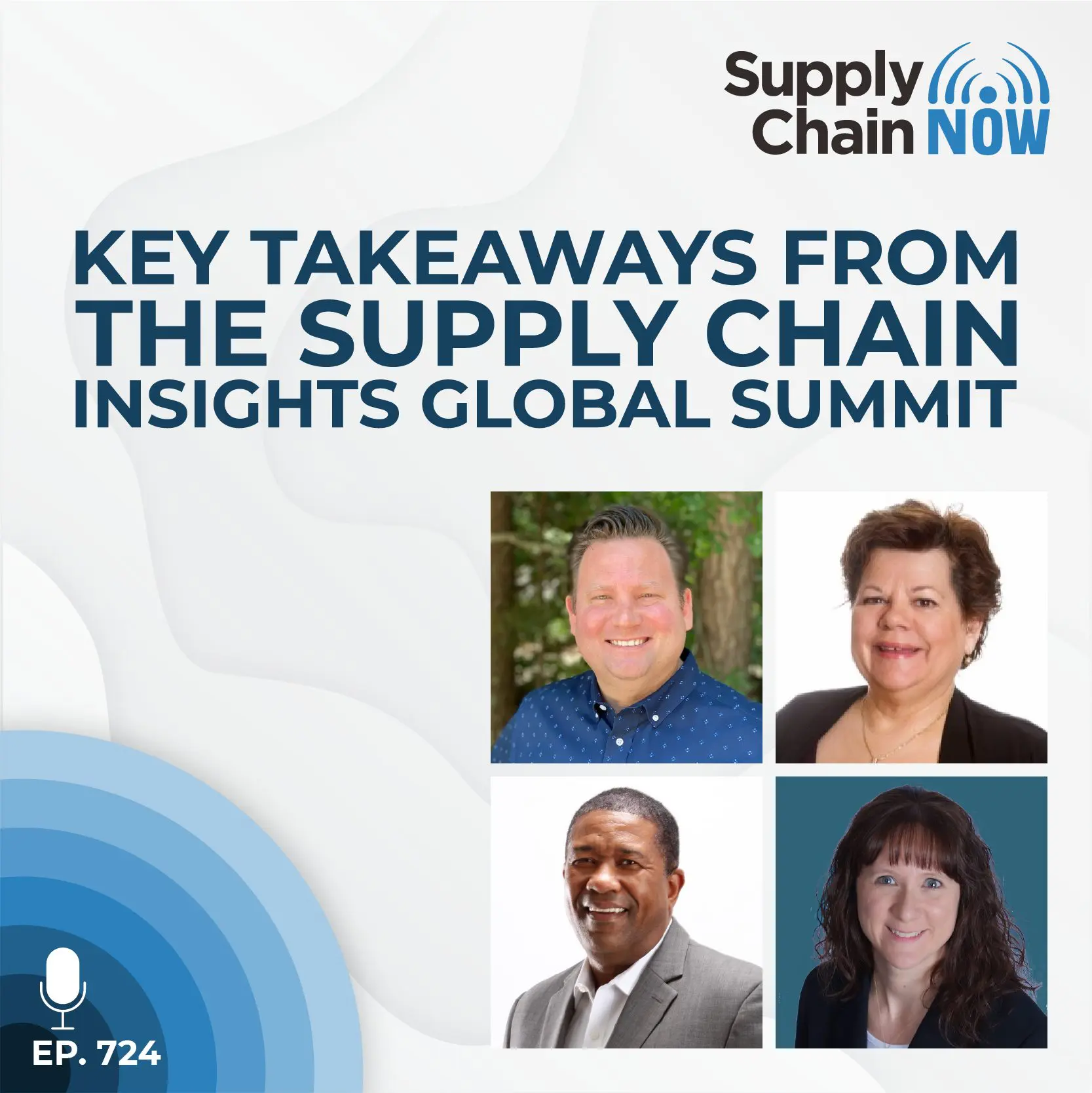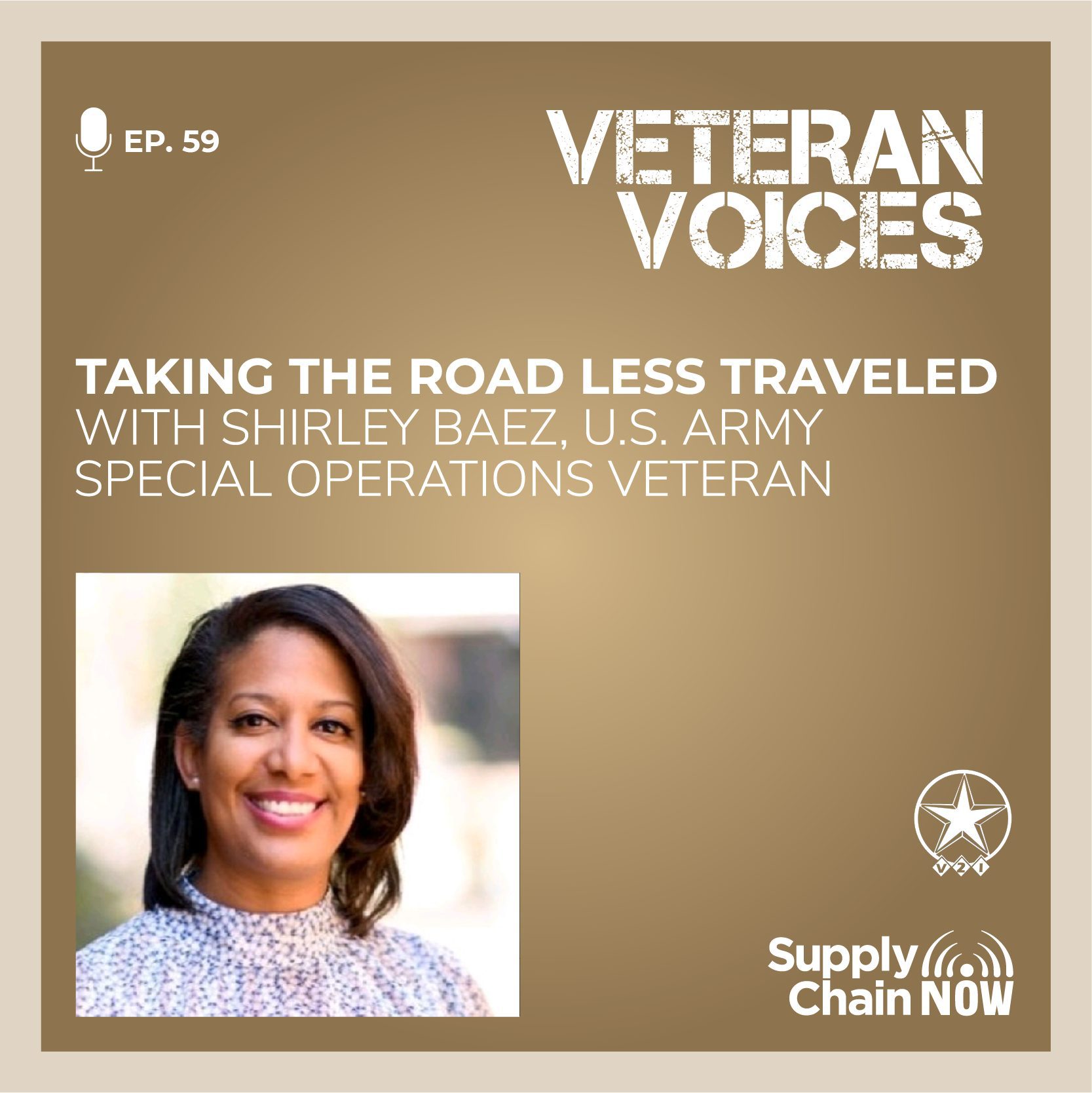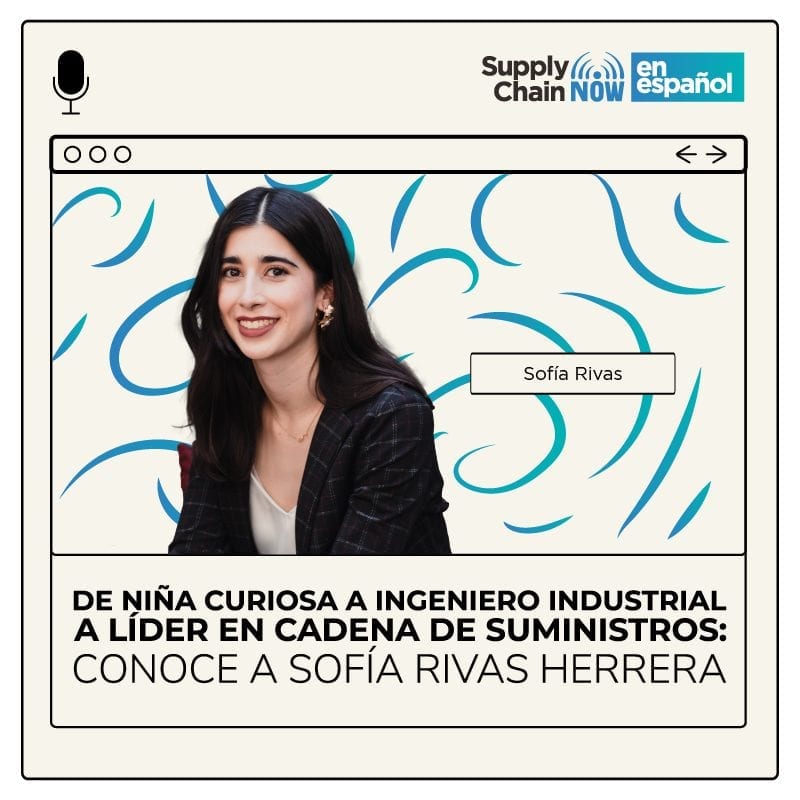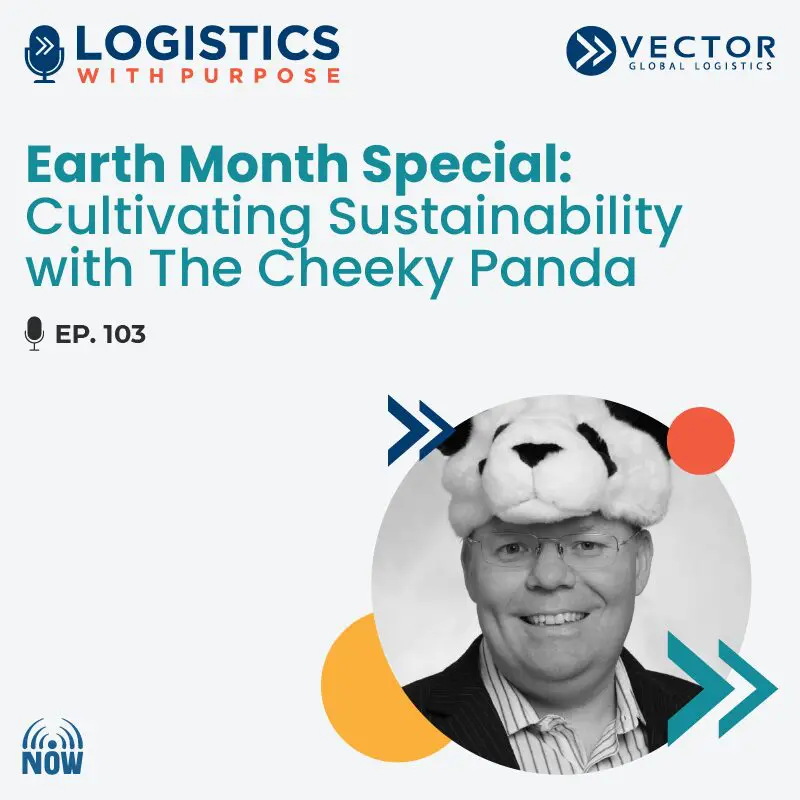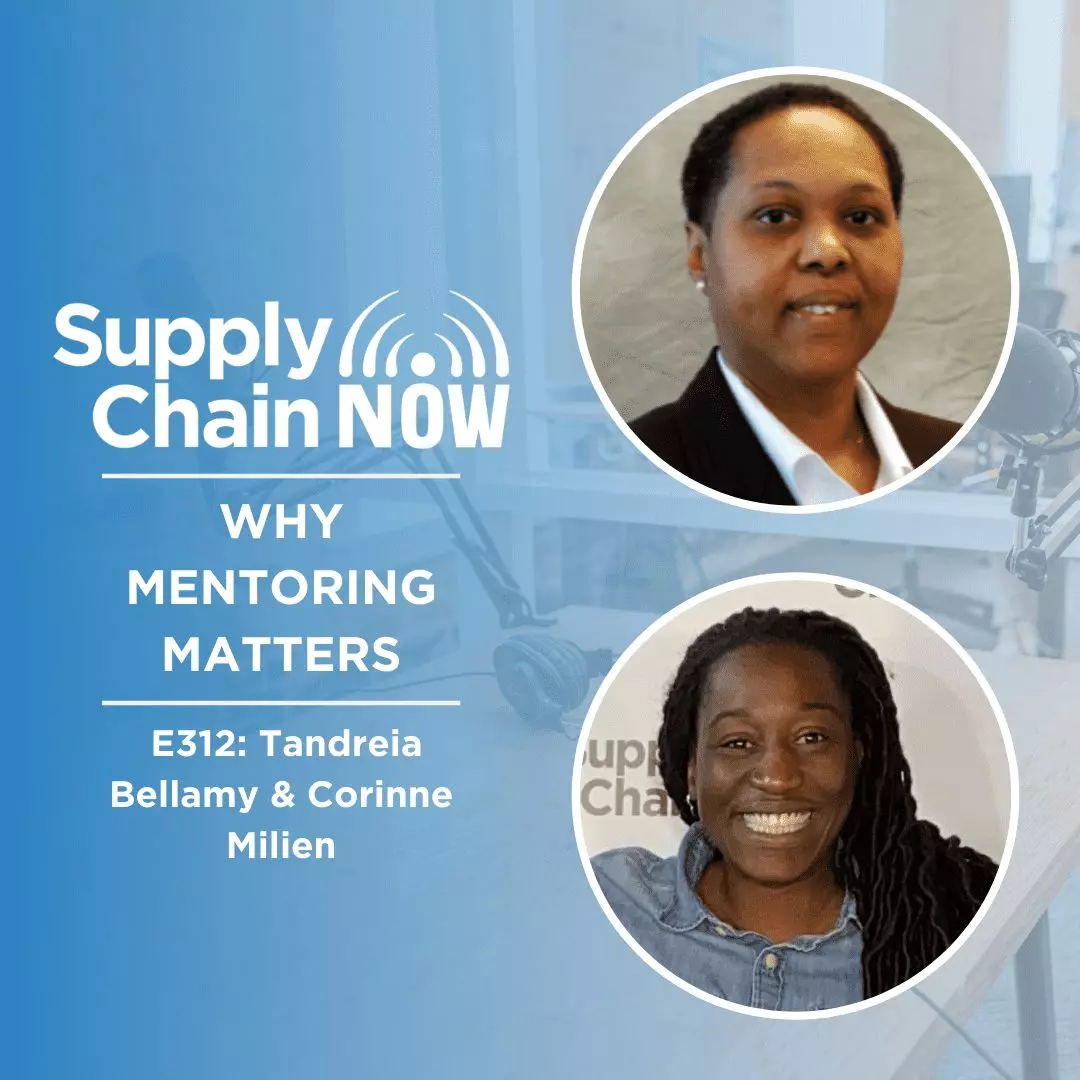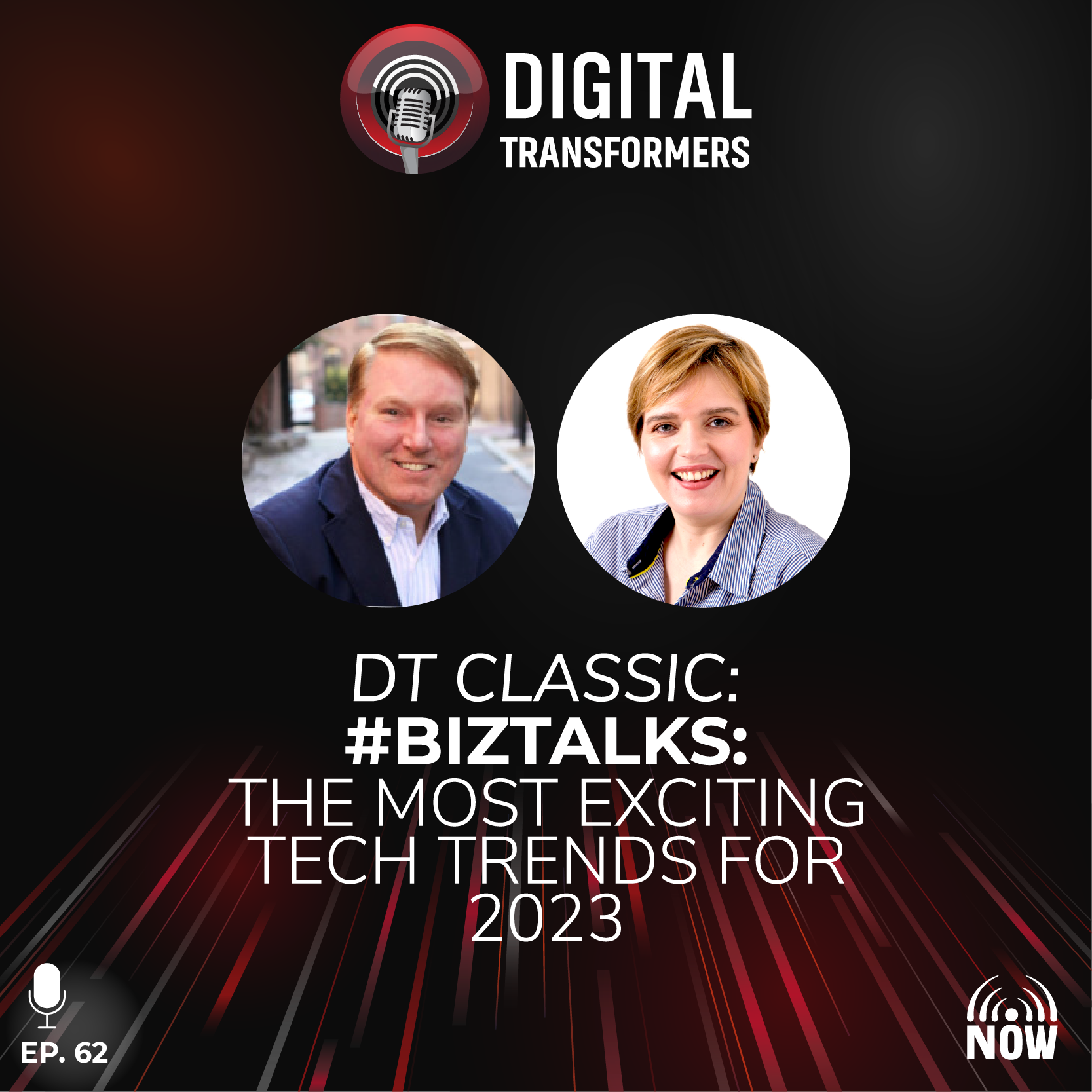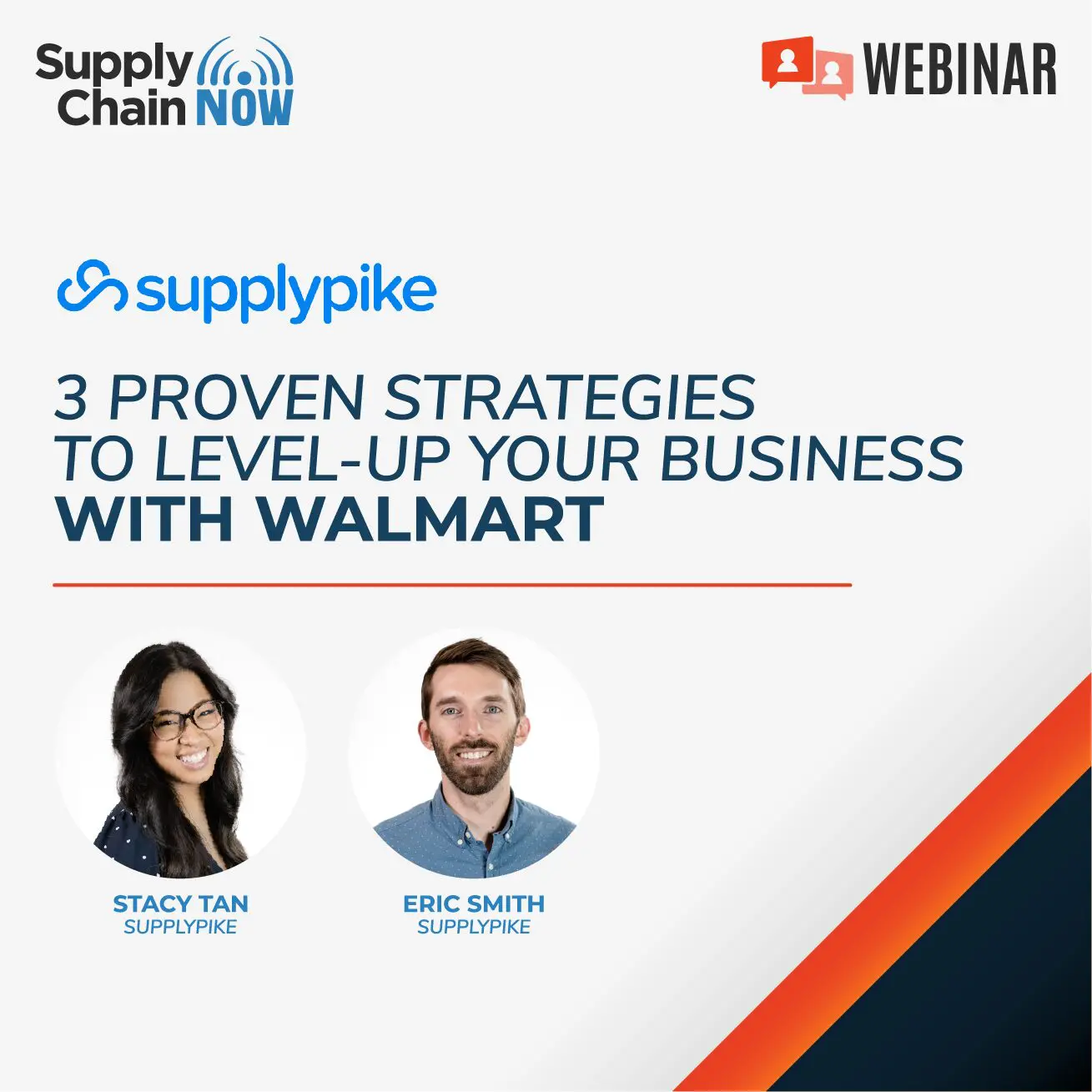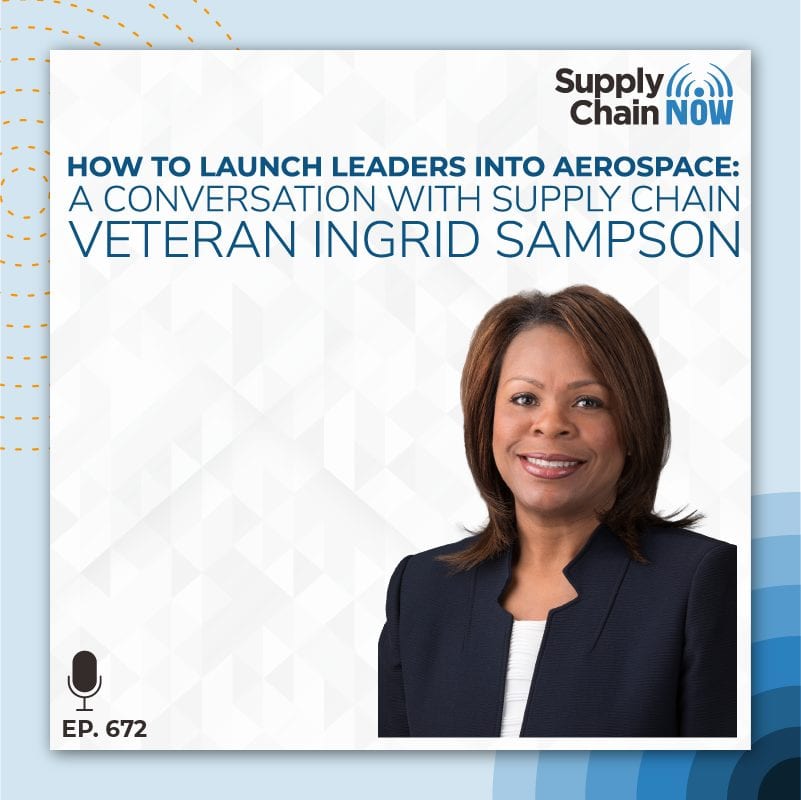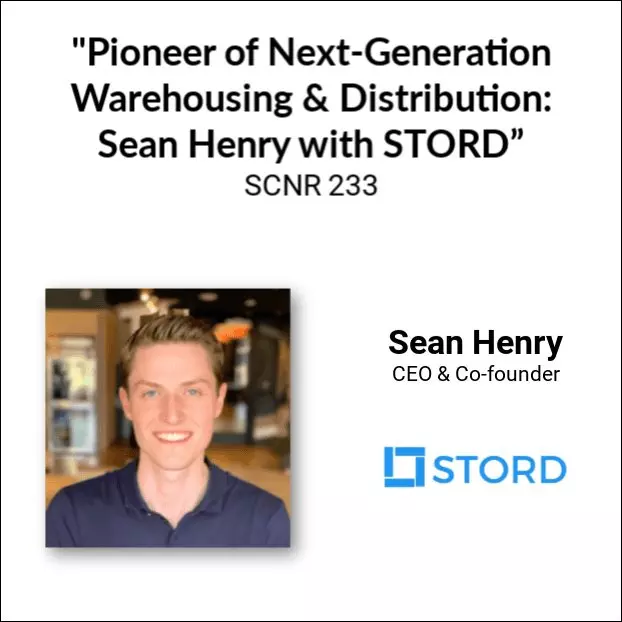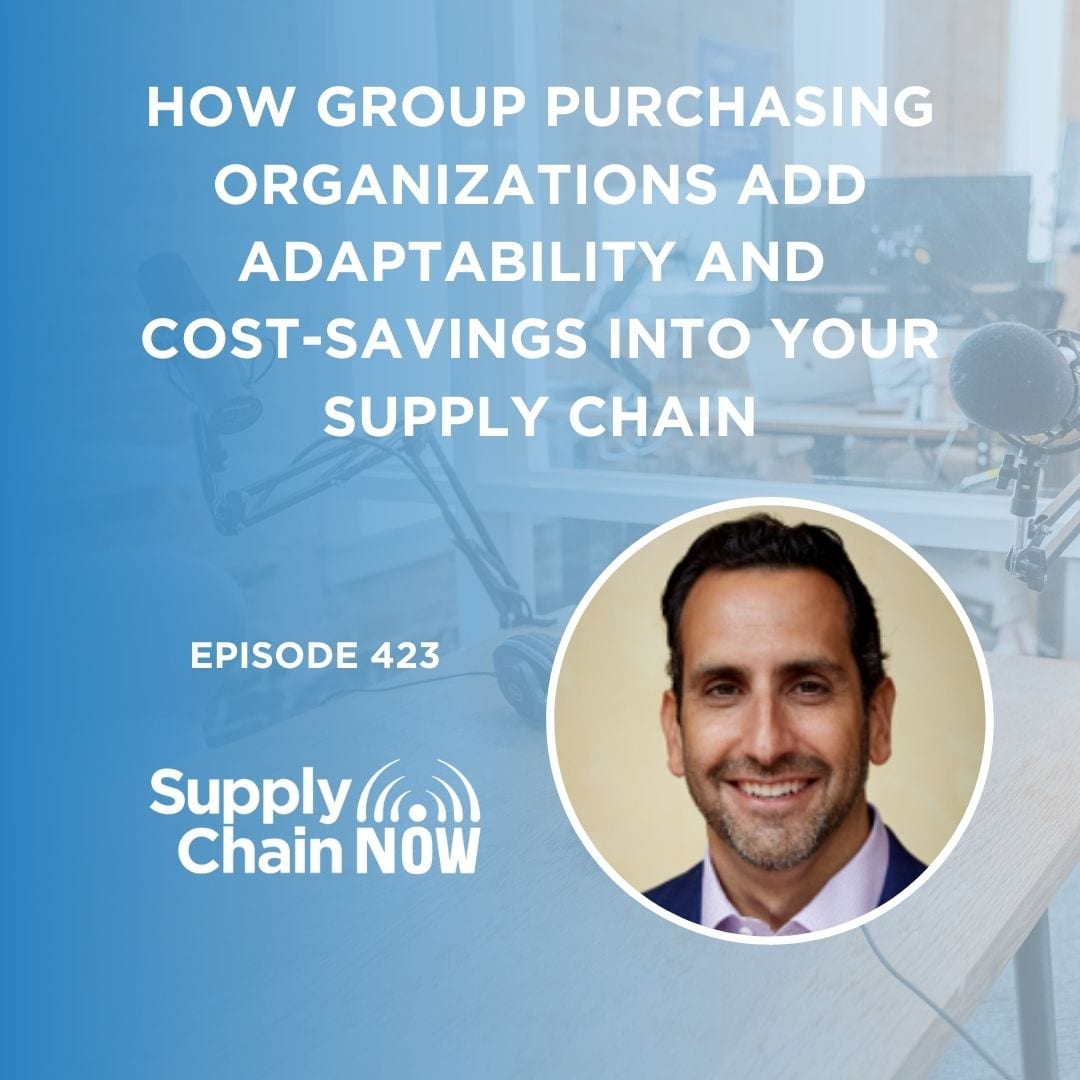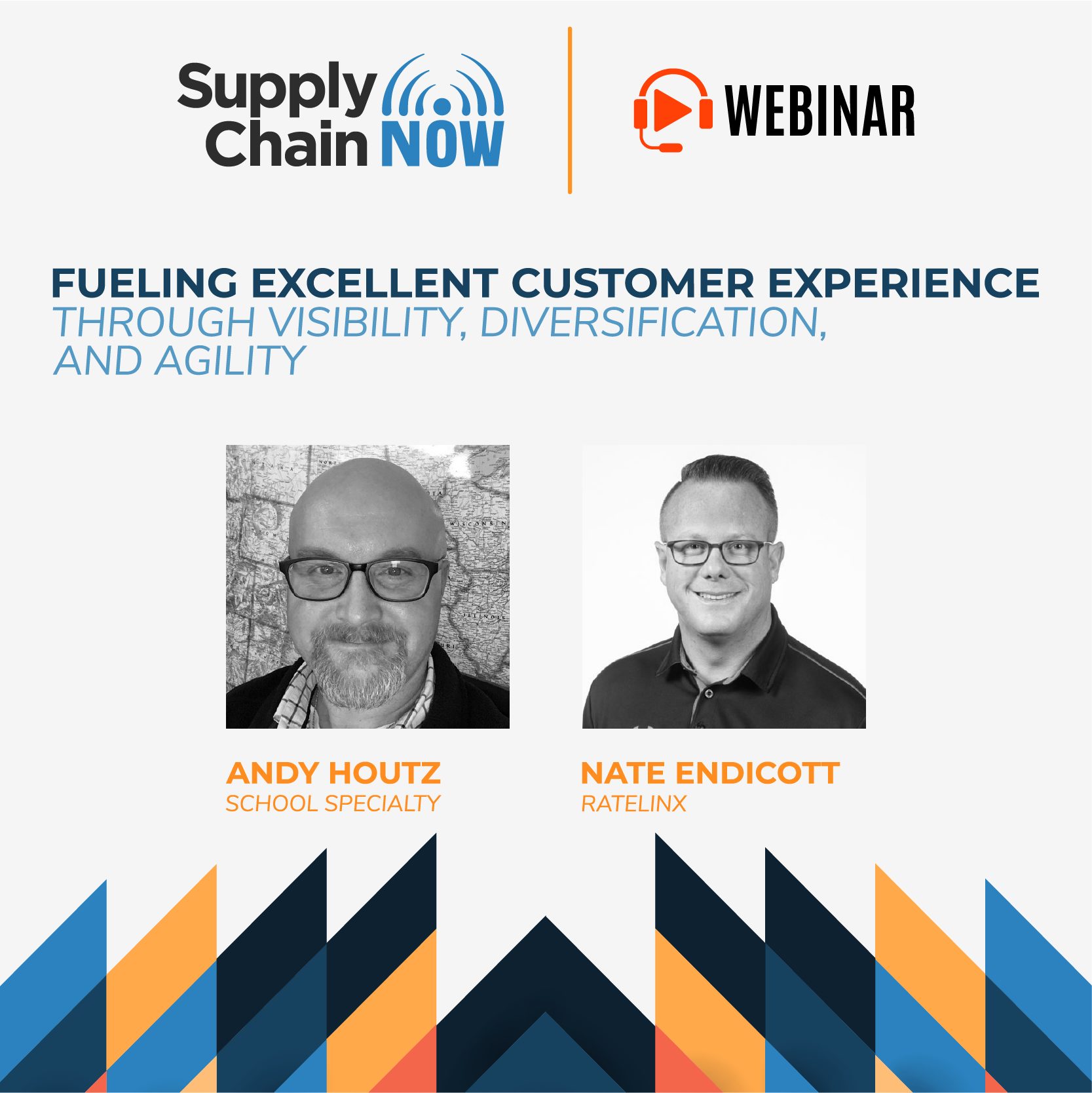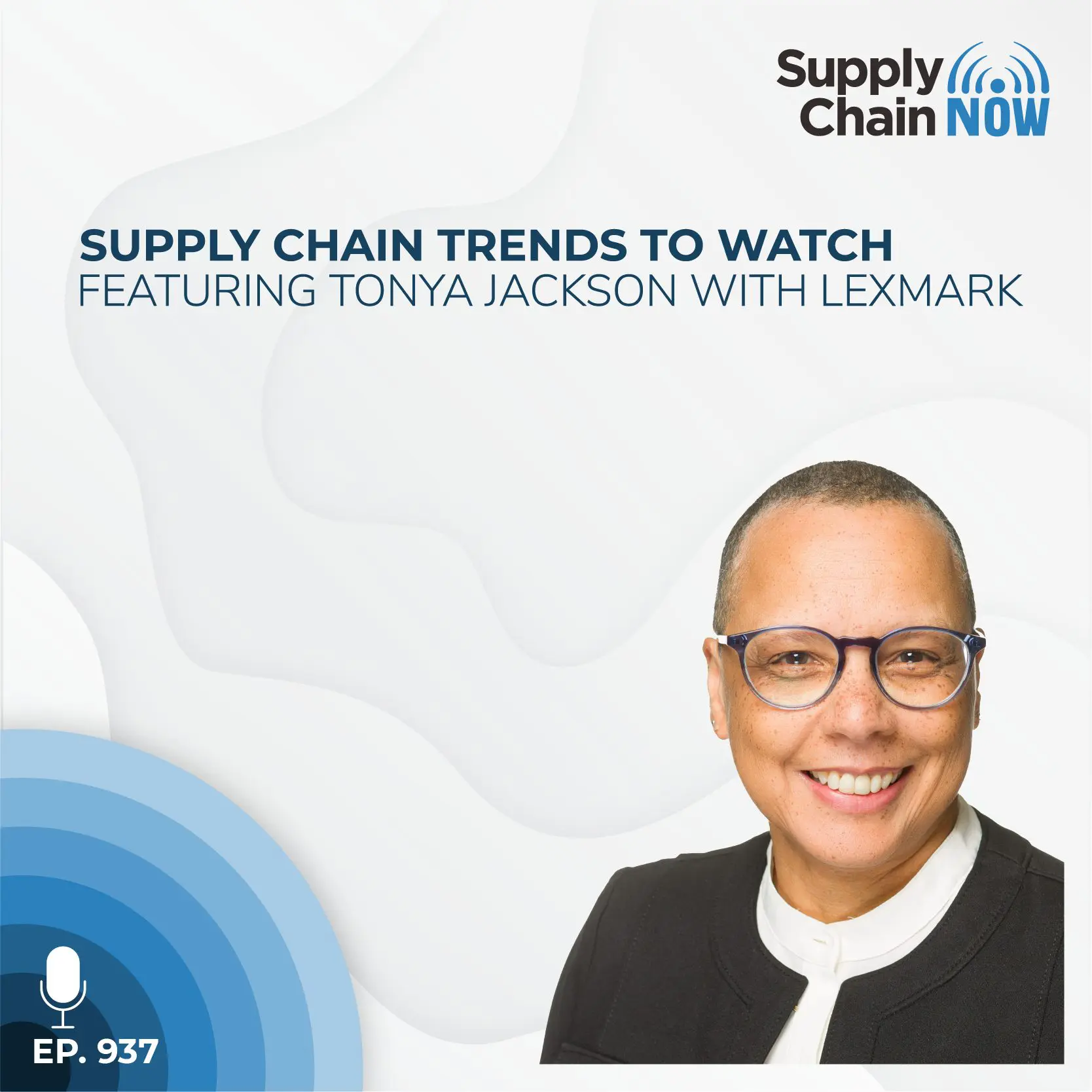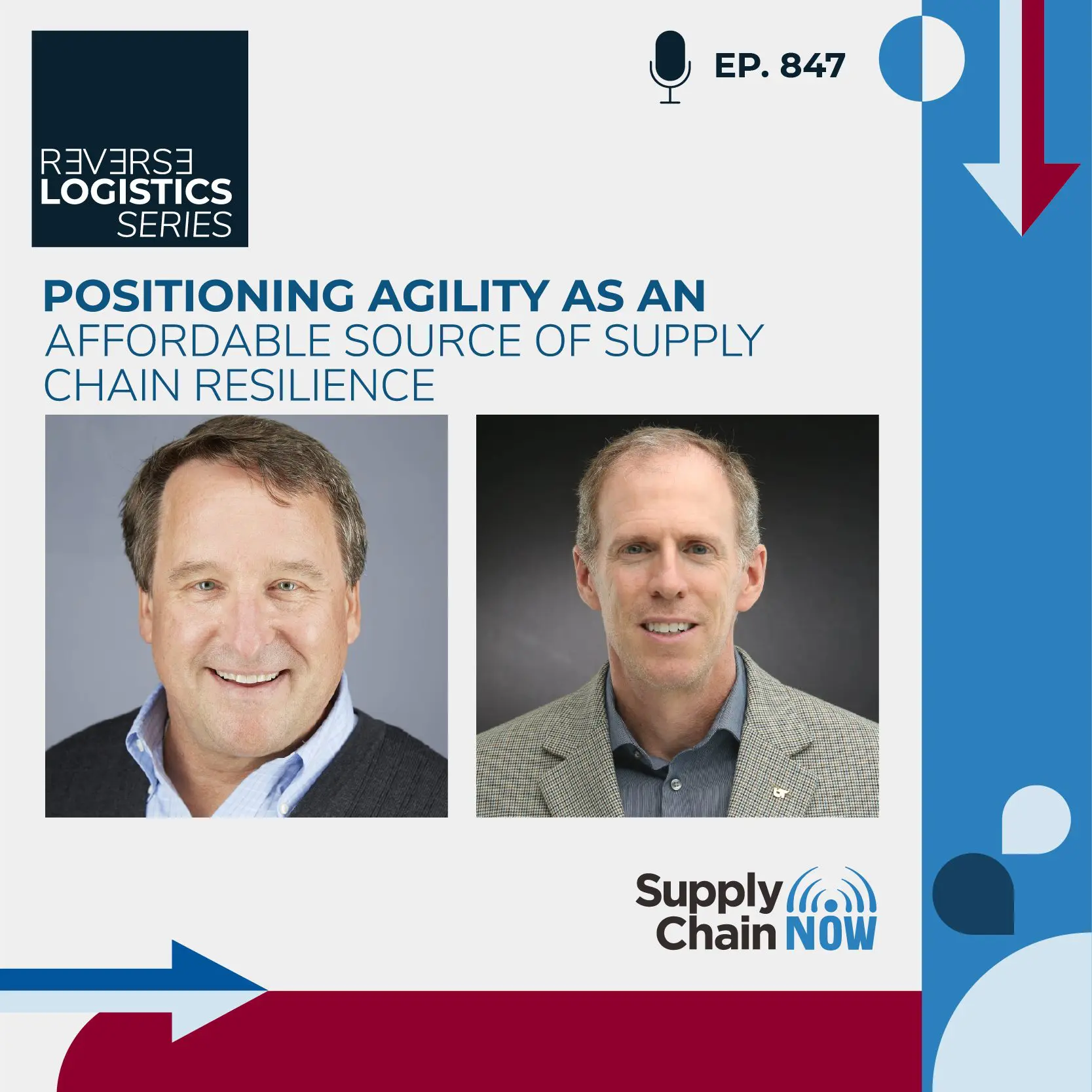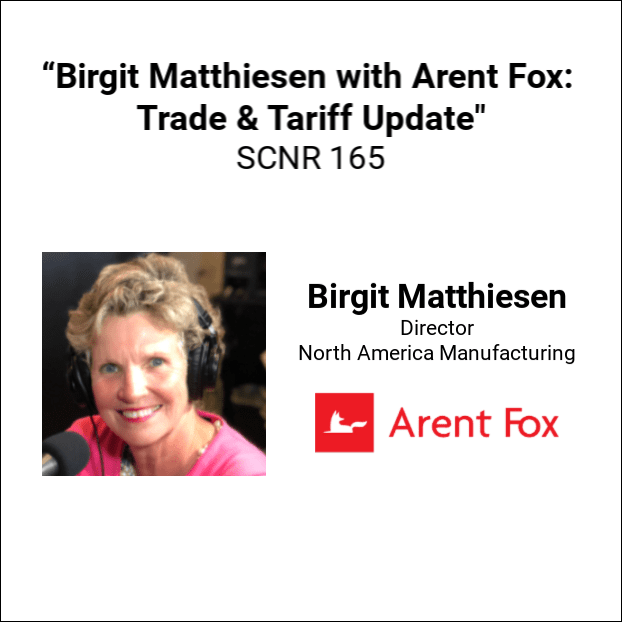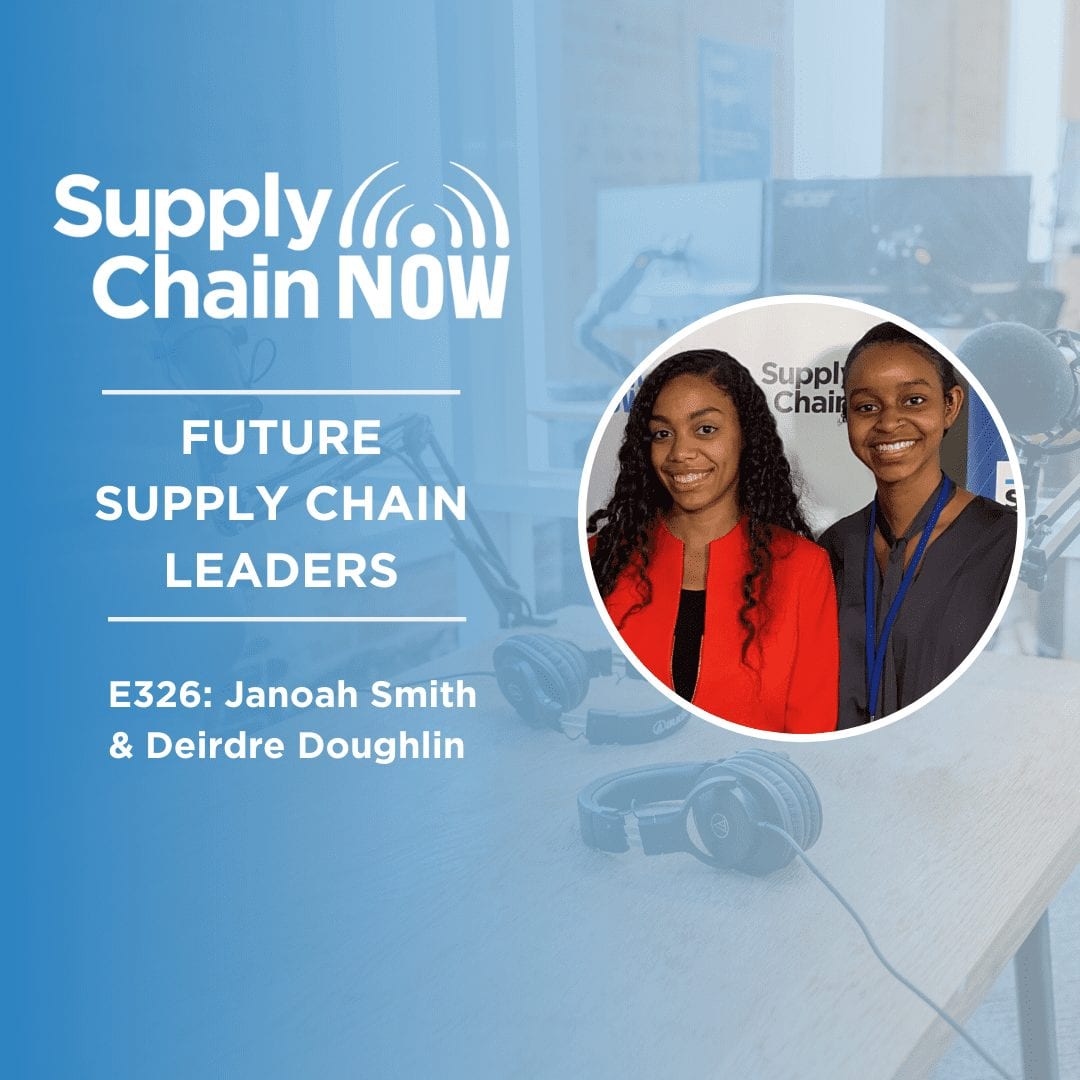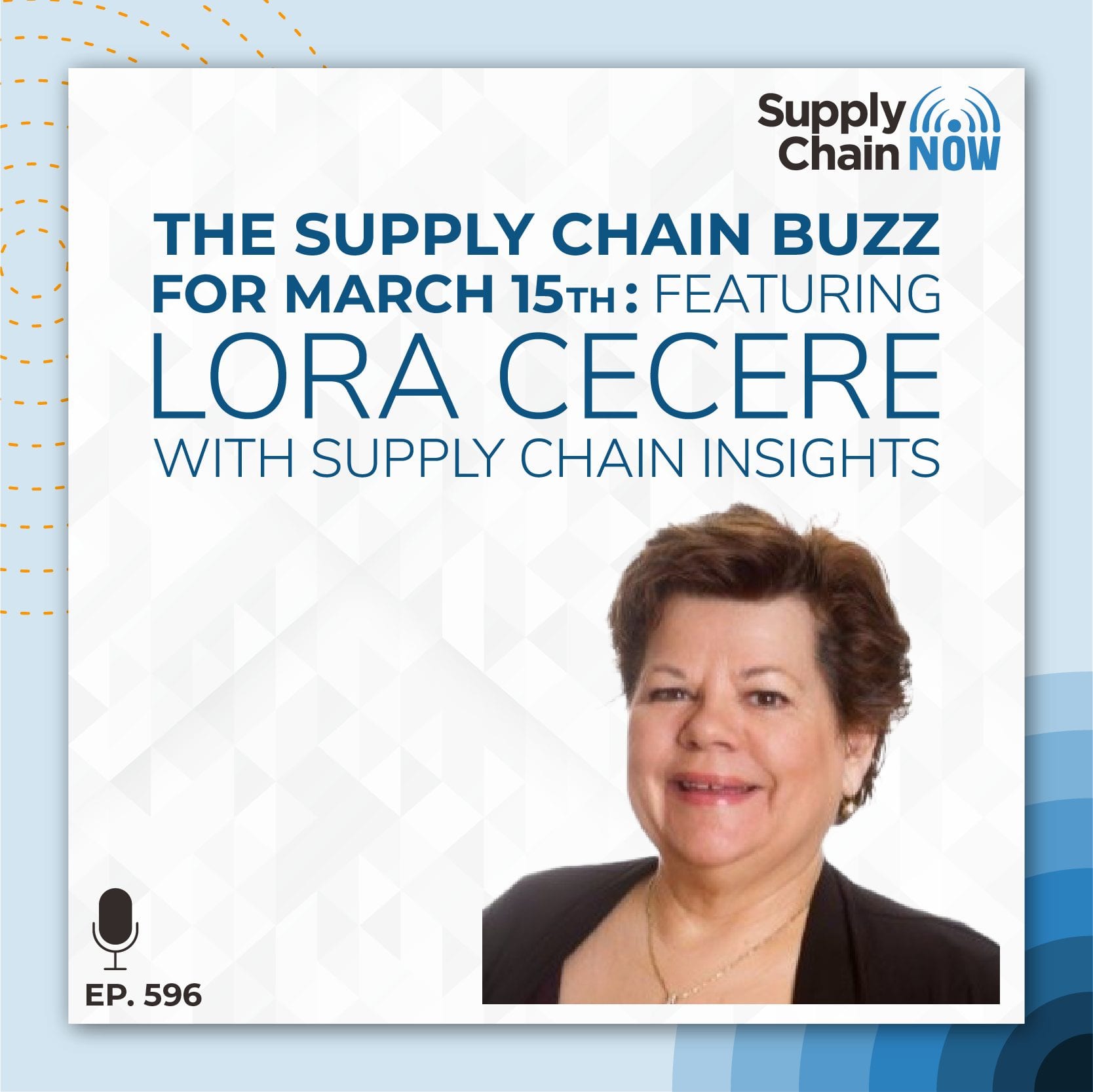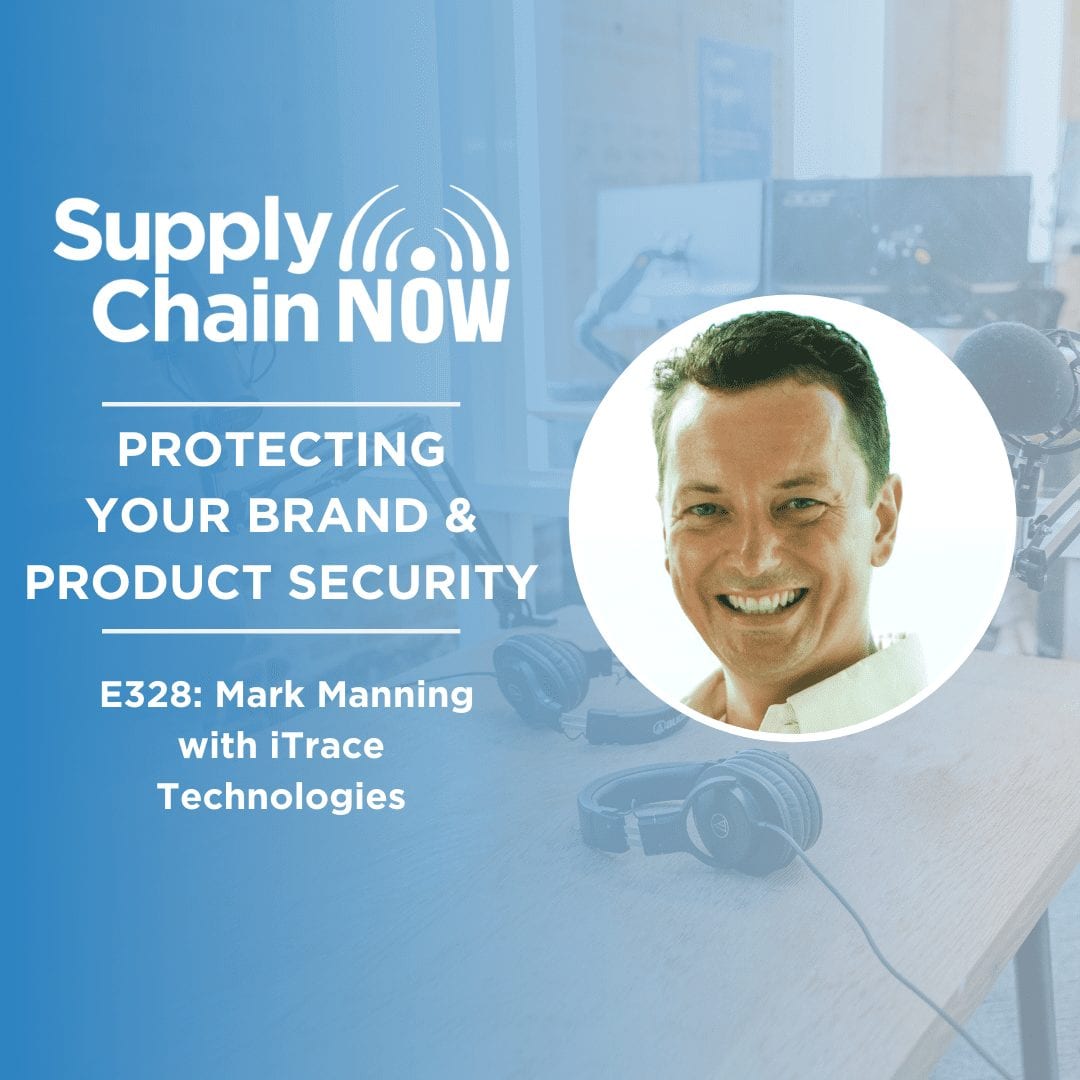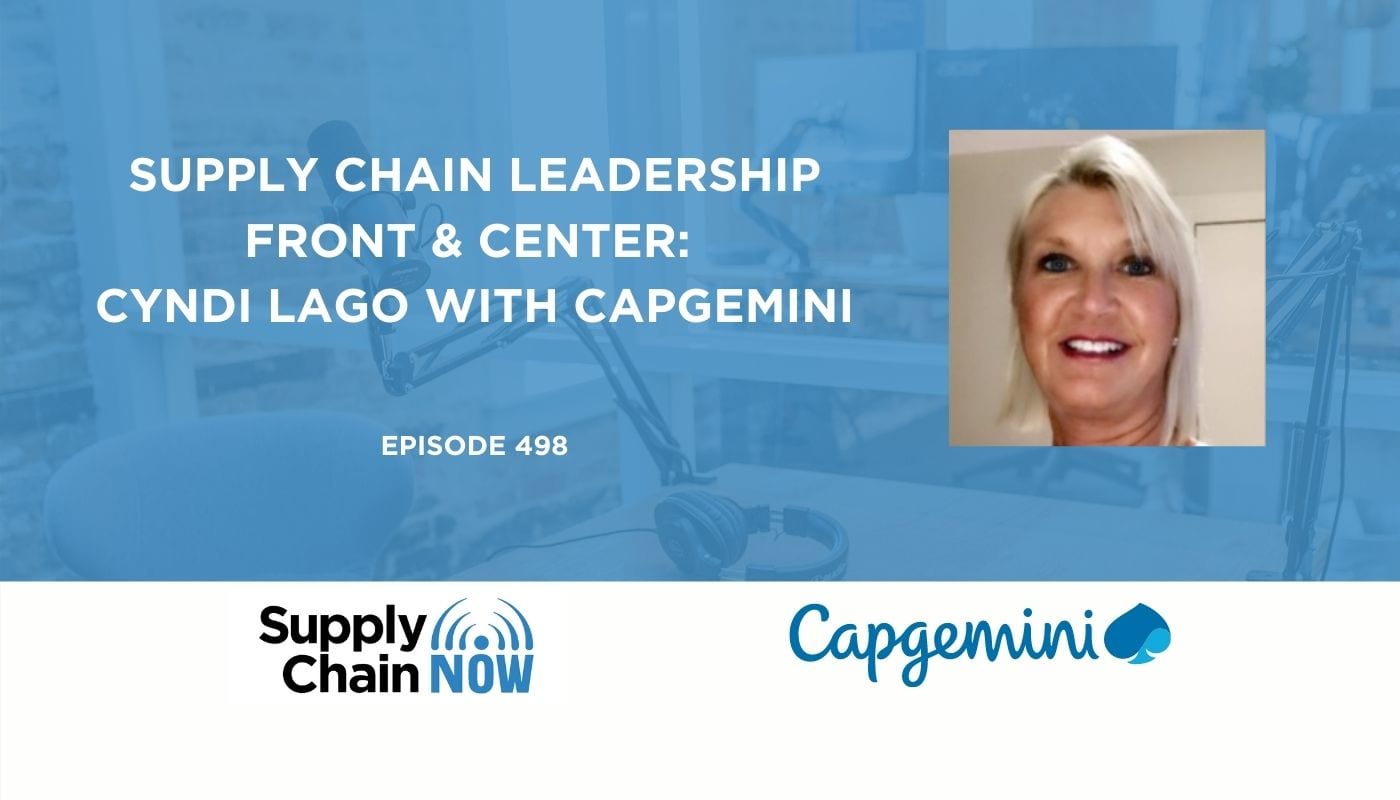
Episode Summary
“It doesn’t matter who you are. You should be bold, and you should be your own best advocate.”
– Cyndi Lago, Vice President and Leader of Supply Chain, Capgemini
Excelling as a female executive in a male-dominated area like supply chain is no small feat, but Cyndi Lago, Vice President and leader of Supply Chain for Capgemini, proves that it is absolutely possible with the right mindset and work ethic. In fact, she is quick to point out that the greatest obstacle most professionals face is their own limited perception of what they can achieve.
She spends her time working with companies that need to digitally transform their supply chains to improve their efficiency and visibility by improving processes as introducing technologies such as AI and machine learning.
In this conversation, Cyndi tells Supply Chain Now Co-hosts Greg White and Scott Luton about:
· The advantage of combining bright, business-oriented people with advanced, teachable technologies
· How companies can help their supply chains become more profitable and more sustainable at the same time
· The power of a supply chain to affect every aspect of a business
Episode Transcript
Intro / Outro (00:05):
It’s time for supply chain. Now broadcasting live from the supply chain capital of the country. Atlanta, Georgia heard around the world. Supply chain. Now spotlights the best in all things, supply chain, the people, the technologies, the best practices and the critical issues of the day. And now here are your hosts.
Scott Luton (00:28):
Hey, good afternoon, Scott Luton and Greg white with you here on supply chain. Now, welcome to today’s show Greg. Good afternoon. How are you doing? I’m doing well. We’re pretty excited to have this conversation. We are one of our favorite guests, one of our favorite guests. Seriously, this is one of my favorite people. So yes, we need to hear real life practitioner turned to changing the fortunes of corporations. Love it. Well, you know what, also what’s exciting here. Cause we kind of, we got the best of both worlds, not only to have an outstanding guest, but we’re relaunching a re-invigorated full access series, right? Where we’re focusing on really an empowering and uplifting stories of women in senior leadership roles, leading organizations in this shifts doing big things. And there’s so much that we’ve gotten feedback wise from our audience about these types of conversations, right?
Scott Luton (01:19):
Yeah. I mean, first I love the spirit of this series and I can’t think of a better way to start it with then one of the most powerful leaders I’ve met anyway, but certainly an already empowered female leader. So yeah, I mean, I just think this is a fantastic start to the series, plus, it’s going to be a heck of a lot of fun. So we’re going to work really hard to increase your supply chain leadership IQ here today. Hey, quick programming note, if you enjoy today’s conversation, be sure to find us and subscribe. So you don’t miss these conversations wherever you get your podcasts from. All right. So now that we’ve really tee things up because we are excited about our guests here today. Let’s do them really well. Welcome our guest in we’re we’re talking today with Cindy Lago, vice president with cap Gemini of course the global leader in consulting, technology, digital transformation, and a whole lot more.
Scott Luton (02:11):
Cindy, how are you doing? I’m good. How are you guys really good. Glad to have you with us. I’m excited to be here. We were talking to pre-show, you know, the last time you were with with both of us, you know, it feels like it was about five years ago. It was probably about a year and some change you go and the bank of America tower and smack dab, middle of Atlanta had a great conversation, fun, engaging conversation. And we’re, we’re really excited about having you back on here and putting our finger on the pulse, but with, uh, more of an emphasis on your background, your journey, and some of your key lessons learned through it all. So you’re ready to dive in. Absolutely. Let’s go. All right, Greg, where we start, like the last time we were together with Cindy, she coined a phrase that I can never put finger on.
Cindy Lago (03:00):
Do you remember that? The bathroom
Greg White (03:03):
One that’s right. We were talking about customization and retail to the consumer.
Cindy Lago (03:09):
Yes, but that’s the one by the way, I still hold the trademark there. I’m sure you do she from right out there and did that. Right.
Greg White (03:20):
All right. So let’s for anybody who doesn’t know who you are, let’s do get to know you first, tell us a little bit about where you grew up. Your family situation is really cool and, you know, give us some of your fond memories of childhood and how you keep them with you. I think there’s an interesting story.
Cindy Lago (03:36):
Yeah. So, um, so I grew up on my farm dairy farm, right? So, um, in Ohio and I still spend half of my year there, um, with my, my family close to them. When I started traveling all the time, I decided that, you know, I don’t want to spend vacations. This is the thing that was so let’s spend our weekends. We were all visiting. No didn’t ever, never imagine that it would be five days a week, seven days a week for months on end. But yeah, but it’s, um, you know, thus moving to Florida, you know, so my, my childhood was, was definitely raised on dairy farm family farm for many generations. We’re on the fifth generation. Now my nephew will be taken over in a few years. So it’s pretty exciting. You know, my fondest memory is, is probably just that, you know, the work-life balance, you know, the good news for me is that going up on a dairy farm, you know, you kind of work in life or there were mingled.
Cindy Lago (04:33):
And so my work life balance has probably been the, been easiest for me not to define them as work-life balance. Right. But just, you know, how do you find that balance period? So I think, you know, having that, having that work ethic and, and really, you know, kind of more of a hands-on approach of learning things and doing things and then, you know, and then teaching others and helping, you know, companies learn and, and grow and do some different things differently. Um, I think I contribute a lot to how I grew up and how I, um, my family worked with me and how, you know, how we all worked together on the farm to make some sense. So
Greg White (05:12):
I have to ask you, did you have a particular task or role or area of responsibility?
Cindy Lago (05:21):
So did I, yes, we had, I had a particular Castro role. Um, I, you know, of course was assigned female duties because, you know, I grew up in a very, very, you know, male dominated world at the time. So that went over well with me, as you can imagine. So I just, when I was in fifth grade that I would learn to Mel because I figured, you know, why not? So, so I did get to do that for awhile until I just, um, it wasn’t all hyper and the cows got scared and I had to, my father asked me to stop. So really
Greg White (05:58):
Rushing them.
Cindy Lago (06:00):
I wasn’t rushing them. I was just, I would be bored in between waiting for them to finish. And so I go out and do things and make noise and he’d be like, no, can’t do that. I’m like, what do you want me to do? I’m bored. So, no, it was all good. It was, um, you know, it was, he was very, you know, I, if I wanted to be, you know, whatever a boy can do, I can do that was my, you know, so, so it was definitely led to, to, to inspiring me, um, to drive me heart and to drive hard into no, but also to, to, to really, you know, realize that, you know, taking pride in what you do and, and doing things, you know, well is important. And, you know, I think a lot of times, and being sincere and, and very, um, honest about what, how you, you know, about life and, and some really great values that, but I think, you know, I, I wouldn’t have given it up for the world and to be out in the country and as a kid and being able to run around and do whatever you want, that was pretty cool.
Greg White (07:05):
And you mentioned that whole work-life balance thing. I mean, it’s really hard to draw a line there, but
Cindy Lago (07:11):
It is, it is, it really is. And, and, you know, so I never, I never looked at work-life balance as being as defined. Um, you know, sometimes that’s been to my detriment. I think you have to, you know, there, there is definitely a, um, when you, when I think of, you know, when I talked to, when I talked to a lot of the people that either work for me, or actually other companies or colleges about, you know, about work, the work-life balance always comes up. And especially as a female, I think work-life balance comes up even more. Um, and I, you know, one of the things I always tell them is there’s no definition, you know, everybody has their own definition of work-life balance. You know, it’s, it’s, it’s what you, what you feel makes works for you. I want how you balance it. So, you know, for me, it’s being able to switch back and forth and it’s being able to, to, to be, you know, doing work, but then if I need to do something that’s, you know, personally related, you know, I have to give myself that break and say, okay, go do that.
Cindy Lago (08:10):
Um, but you know, it’s, it’s, everybody is different. You know, you would tell people that, you know, women that had families are going to be like, well, you know, I have my kids and I, I, you know, I’m like, you need to have your own work life balance. I mean, but the big thing is you got to communicate that to people. You need to say, Hey, you know, nobody’s going to get mad. If you, if you need to go take care of something, as long as you communicate to them, you know, people just don’t like being surprised, Oh, I’m sorry, I’m going to be off every day at this time because of this. And you find out on accident. So yeah, no, I think it’s, you know, it’s definitely in today’s day and age, you gotta draw your own. Um, you’re gonna draw your own lines, but you gotta do it respectfully and you gotta communicate it well. And I think, you know, as a leader, that’s, my job is to make sure that my team is defining their work life balance in a way that works for them, but also making sure that, you know, they also are communicating to the rest of their team and setting expectations, because I think, you know, people get upset when they have expectations. They don’t get upset when they know, you know, what’s going on. So,
Greg White (09:11):
And that communication has gotten more challenging in this current work, from home environment where we all folks that have ever over-read into an email or, you know, a passive communication, it’s more challenging. You don’t have that, that opportunity at the water coolers we talk about or to pop into the cubicle or an office or a group session and be able to have that face to face or not, not, not at least not as often as, you know,
Cindy Lago (09:35):
No. Agreed. And you have to like, kind of, you know, like you don’t, you can’t walk down the hall with your, you know, what’s one of your clients and start, you know, talking about like, how do you move things forward? It’s, it’s very, um, compartmentalize, right? Because you’re on the screen and you’re either on the screen talking to them or you’re on the phone. And then it just depends. And it’s not like this, you know, Oh, you know, let me just, you know, I loved the new commercial where the guy’s answering somebody’s phone, phone, phone message by driving up to his house and, you know, you know, so pro your life, like I know, so that’s, it makes for some long days sometimes because I do want to spend time, you know, talking to my team and not just answering the email because it is it’s. So I think it’s important to have those conversations. So
Greg White (10:21):
That’s really interesting because I think you having lived on a farm and I haven’t worked some on a farm, you’re never off work, but you’re also never off life. I mean, right. The neighbor could come over while you’re in the middle of your work and you could lean on fence posts for the rest of the day, just shooting the ball. Right. Not literally shooting the bull. I don’t think people are not on farms. They probably don’t know that. Just a figure of speech people, but I mean, but that could happen. Right. Or you could, I mean, you could have the situation where you got a duck and do something and then get back to where you were. So I hadn’t really thought about it from that perspective, but that’s a really valuable way to be able to, to work, especially in today’s day and age. Right. Yeah.
Cindy Lago (11:09):
It’s sort of like Murphy’s law, like every holiday, I swear, there’d be something that broke and you’d be like, Oh, okay, well, we’ll hold off in seconds.
Greg White (11:19):
Right after lunch, right after dinner. So, so it sounds like obviously that life experience was a great influence on you. I mean, if you think about your early life probably pre career, who would you say, or maybe it’s multiple people, but w w what people, or instances or experiences would you say had a big influence on you and, yeah,
Cindy Lago (11:44):
Well, I mean, I would definitely say growing up the way I did, I mean, I grew up, you know, and I think it has double on it had an influence both ways, you know? Um, I learned, you know, how to, how to be a good business person, how to work hard for my father at the same time, I learned that, you know, I don’t want to be a lady from the fifties and sixties, and I want to have my own independence. And so, um, not that he was from that gender, he, he definitely, you know, lives much more of a, uh, farm life and that, so, so I think I can handle both things from them. Um, I, I learned, you know, from, I opened, I was always encouraged to follow my own passion. I mean, ever, you know, was expected to, to like just hang out in the country for the rest of my life and, you know, not move on.
Cindy Lago (12:35):
And I think, you know, having, having that support system from your family and having, having that, um, willingness to be able to, to go and succeed in that, that, that pushed to do it. You know, my, my, um, my parents said, you know, they’re like, okay, you’re going to college. Like, there’s just certain expectations. They never went to college. They were just like, you’re going to college. You know, you’re doing these things and not as the oldest child. So, um, you know, there was a lot around, um, you know, from a perspective of, this is what, you know, this is the direction you need to, what you need to do. And a lot of the guidance that was given to me, and I think that, you know, a lot of that, um, structure, um, really helped me grow. I would say that, you know, then, then when I started my career, I think I, I didn’t know what to expect. Um, and I went to, you know, when and majored in fashion merchandising, which is probably the farthest thing from farming that you possibly can do. So, you know,
Speaker 6 (13:33):
You’ve been intentional by your parents. Exactly. No, but,
Cindy Lago (13:37):
Um, I really was interested in retail and, and from the very beginning have always been very passionate about that. And so, um, went into to that in, into the whole merchandising and buying side of it. And, and, you know, I think, um, having, you know, the business background of being working on, you know, growing up in a, in a self-employed background and then driving into, you know, learning how to manipulate the business world and, and some of the core lessons around, you know, just people and skills and, and how do you really focus on, on driving, um, your career and your success was, was part of me was a little naive. And I would say that, you know, I had some big supporters in my career, um, that really helped push me over that, that edge. Um, and why do I say that is, you know, when you, when you focus on, you know, thinking that doing the right thing is going to always, you know, which is really important and you should always do the right thing is going to get you to where you need to be.
Cindy Lago (14:41):
And, you know, you really have to also then learn how to lead. And I’ve been, I think the fortunate thing that I was that I was very fortunate is that, you know, I, I worked for some individuals in my first career where they, you know, they gave me a lot of opportunity to grow. They put me in new positions because they saw my willingness to learn. And so I was in, you know, working in new areas and got into planning and inventory management and all of the supply chain functions that, you know, it wasn’t the kind of the furthest thing, but they saw that, you know, I was always willing to take on more and I wanted to learn more and I wanted to grow. And so I appreciated that, um, opportunity, but then, you know, going in and, um, working, you know, for, for my first female boss and learning good and bad about how to deal with people.
Cindy Lago (15:29):
Um, and I don’t mean that in, in the point of that work, I got a lot of support in my, in my career from both male and female, but I would say that, um, learning how to be a, you know, uh, a leader and, um, balancing some of the things that happen when you’re in kind of a male dominated world, like supply chain tends to be, um, was very fortunate in my career to, you know, to get in, um, support and mentorship from, from women executives. And, um, you know, I worked for a jewelry company and probably, you know, one of the first female executive vice presidents that I ever worked for. And she was very supportive and, you know, both from a business perspective, but also a personal perspective. So, you know, it really helped me grow. And I think that, you know, having that mentor, having, um, that ability to, to talk to somebody around, you know, what you want to do and drive, and whether it’s a female or a male, I think you have to have, you have to have those, those people that can help you move your leadership skills forward.
Cindy Lago (16:35):
Um, and that’s really, you know, been, I’ve been very fortunate in that I’ve been very fortunate to have, you know, find and get head, to have mentors that have helped me grow in that direction.
Greg White (16:46):
I have to ask you a really quick question. And, um, because you made me think of this in talking about your youth. So sometimes in the Midwest, and sometimes in, especially in the farming community, I always think, I always wonder if everybody in the Midwest isn’t somehow related to Mark Twain, because one they’re great storytellers. They are Midwestern. People are fantastic. Everything is fascinating to Midwestern people. It seems like so often. And, and the other is they tend to do these thing, this thing where they’ll say something that is somewhat obscure and it’s like a life test, how smart, how witty, how, uh, introspective or how insightful is this person? If I give them this little nugget, how do they respond to that? Do you remember that ever happening to you? Somebody kind of giving you half the information or half a sentence, a, you know, one of those words of the wise type of moments and, and did any of those ever stick with you?
Cindy Lago (17:53):
Yeah. I mean, I think that, um, it is funny that you say that we’re great storytellers, because I do think that, um, maybe it’s because we have nothing else to do. We just tell stories. Yeah.
Greg White (18:07):
I’ve always thought fascinating because everything is so normal in the Midwest. Right. You basically, you do your work, you do your schoolwork, you spend time with family, you go to bed, right. And you get up and do it all the same way all over again. And the next day,
Cindy Lago (18:24):
I think we, I think because it’s like that we, we focus on, we try to find adventures. Yeah. You know, I, I do. Um, yeah. I mean, I think we, we w we can be obscure sometimes I think in how we talk, because we, you and we infer a lot. I, you know, I think that you, when you grow up in the Midwest, you, you kind of, you know, there’s a, there’s a certain word that people have. There’s a certain, um, way that people work and you just kinda know,
Greg White (18:53):
I feel, I felt like it was a constant test. I mean, like people would give you half of it, and really, you could almost feel like they were trying to activate your brain to see like, how you would respond to that. Um, and it’s interesting because I hear a lot of that. I hear a lot of what you’ve taken away and taken into your career from, from those types of experiences. That sounds really familiar to me. So if you’ve watched, if you’ve watched or read anything recently has that has really kind of ignited your thought.
Cindy Lago (19:26):
So, yeah. So, you know, what’s really funny. Um, so the B I, besides trying not to be of soaked up into Netflix series, because I just not, I just, I can’t stand bingeing and drives me crazy because I just have to get to be in. Um, and so I, I just like try to avoid them after, after, um, money heist, I was like, come down and I’m like, I can’t do this anymore. It’s just too much. I, you know, I think that when you, when you asked me this question and the thing comes to my mind, which is really funny, this is my favorite book, which is the Alchemist by Paulo COA at cologne. I’m an excise me, my, um, and the reason that it’s a very inspirational book. So if you haven’t read it, you need to read it. Um, and I had my 11 year old one, so my 12 year old niece read it.
Cindy Lago (20:19):
And cause she said to me, one day, what is your, what is your favorite book? And so I said, you know, this is my favorite book. And so she read it and she’s like a really fast reader. Like she, you know, she’s reading these books and I’m like, okay, which just like 500 pages long. And she whips through them anyways, the, um, and, and it was very interesting cause I said to her, I said, so, um, she, I said, what are you, what do you mean? She didn’t ever told she read it. I gave it to her. I said, you know, you should read this really good book. I said, so, you know, what’s your, and so we talk a lot about like what she’s been read, what she’s read and you know, what’s her look and she’s like, I go, so what’s your favorite book now? And she’s like the Alchemist, you seriously read it. So then I had to go back and reread it because of course, you know, we had to talk about it. But, um, you know, I, I love to your point about how Midwesterners kind of throw things out there and make you think about it. That’s exactly how he writes. And so he’s a very inspirational writer. Um, and he’s very thought provoking in his writing. He’s by far my favorite author. And as soon as he comes out with a new book, I read it every time.
Scott Luton (21:29):
Really I’m going to have to read it now. The outcome is not a great reader, but
Cindy Lago (21:34):
It is, it is a very fascinating read. I want you both to read it. And then you tell me what you think we got to do a book report for you. Okay. Yes, exactly. We’ll do a call for you.
Scott Luton (21:43):
I want to go back to some of your lessons you were learning. Uh, you talked about, you know, kind of connecting the dots from a, an end supply chain standpoint, you talked about, um, kind of the male dominated industry and, and how that kind of dawned on you early in your career. And then you also talked about adjusting to working for, for folks of all types, right? And, and how sometimes you’ve got to adjust how you, how you follow and probably how you lead on, imagine pointless when you, when you think of the global business and international business. And of course, this is where we live in today. Never going back to, you know, when it wasn’t global business, right. When did that, when did that one element of that Dawn on you? What, what role really comes to mind when you really think of, of that global view and what really shaped that global view for someone that grew up in the Midwest?
Cindy Lago (22:31):
You know, I think, um, so for me it was, it was a, a few different things, you know, certainly, um, getting into retail and starting to get into, you know, private label and imports. And, you know, those kinds of things are really wanting about, you know, we’ll be more vocally aware of things that happen and go on, um, was, was part of it. And then, you know, um, and then having to, in, in my retail career, you know, going, going on buying trips and experiencing more of the culture called being, you know, more worldly from that perspective was definitely an and just, you know, adjusting. And, and, and I always think about when I, you know, got in my first elevator in Hong Kong and everybody gives me elevator and you’re like, and people warn me, you know, you’re going to be very close that’s, that’s, they’re used to it and you’re not.
Cindy Lago (23:24):
And, you know, having an in really understanding, I always, I, I tried to seek to understand cultural differences and, and, and learn from it. Um, and I think that that’s really, you know, to me, I find it fascinating. We get it’s, it’s, you know, intriguing to me, um, how, how we’re all different. And I think it’s, you know, very, um, everybody brings a different point of view. And I think that they’re trying to, to understand that. I mean, like, you know, when I, when I think back to being a Midwesterner, I’m like, you know, I don’t want everybody to be like a Midwestern. I, I like having their pride. So, yeah. So, I mean, I think, you know, to me that was a, that was a big point. And then, you know, and then running my own logistics company with my husband and, you know, really having to, to get, you know, a really understanding of, you know, like the, the, the amount of the different, different people that you meet and the different goals that they have.
Cindy Lago (24:28):
And I think, you know, the reason I say that about the warehousing, cause I’ll just never forget the day. Like some guy comes into my warehouse and, you know, and I was in California and I, uh, we had a warehouse and he knocks on my door and he’s like, can I kind of shift my load? Because his load was, was overweight and he in the middle and he needed to readjust the quote. And then I said, sure, you can come in. And my husband was like, you know, I called him later and he’s like, what did you do? And I’m like, well, you asked me, I’m like, you know, I, you know, and, and definitely had, you know, you know, my husband was giving me a hard time, but, you know, he had, he had a very thick Russian accent obviously had, you know, like, like this is what he’s doing to make, make, you know, make it in America. And so that was, and then, you know, his little son comes out and said Sarah and watches him. And, you know, it was just, I think just all of those different experiences that, you know, you gotta, you need to appreciate everybody’s differences and you need to, you know, um, every, you know, everybody’s trying to do the best they can. So I try to believe in those people, I guess,
Scott Luton (25:27):
You know, as you shared that, Cindy, um, and especially as you know, three entrepreneurs here, and you’re talking about your time running your own logistics company. I think that’s when I have most, uh, that time in my life at least. And it sounds like what you’re sharing, that’s when you really appreciate how everyone is trying to contribute, everyone’s trying to, and what’s important to them move that forward, you know, solve problems, take care of their customers, pay bills and, and, you know, it’s just a beautiful element of the entrepreneurial journey. So I appreciate you sharing that. Um, all right. So I want to, you know, when you talked about your 11 year old niece and what was her name?
Cindy Lago (26:08):
Sure. Her name is Jessica and she’s 12 and she’s almost gonna be 13. So I have been for 11, cause I’ll be in trouble for that, but yeah,
Scott Luton (26:15):
12 year old Jessica say hello to Jessica. Um, I want to ask you this next question and I almost want to ask you what advice you’d give Jessica, but also I want to take advantage of the question I plan on asking you because it’s a different timeframe. And so let’s, let’s go with the first one first. So when you think back, if you had the opportunity, uh, via bill and Ted’s magical telephone booth to go back and tell yourself one piece of advice, say senior in high school, Cindy Lago, or senior in college, whatever you prefer, what would that one piece of advice be?
Cindy Lago (26:48):
My one piece of advice is don’t limit yourself. And it’s the same piece of advice I give to my niece because I feel I watch people. And I, you know, even in, you know, when I, when I was in corporate America and I worked with individuals and they were in certain jobs and, you know, I, I really think that, you know, no, am I capable of being a brain surgeon? No, but I’m not, you know, but that’s not my interest either, but I also, you know, I don’t put parameters around what I think I can be. And I think that, you know, we, we tend to, we tend to limit what we can do and what we can affect and, um, impacted our lives ourselves. And, and so I think that there was a lot of times where, you know, I had to, I had to push myself and, and, you know, I thought, well, I’m never gonna make it through this.
Cindy Lago (27:45):
And I’m just very, you know, I’m very grateful for where I’m at right now. And I’m very grateful, um, that, that I can share those experiences with people. And, you know, and I can also then, you know, hopefully you know, that when you, when I look back, that’s, what’s important to me is like, don’t, don’t, don’t limit yourself. Don’t say that you can’t run a third party logistics company because it’s mostly a male dominated. Well, don’t say that, you know, you can’t be involved in trying a new area and starting a new business, or, you know, just don’t limit yourself, go for it.
Greg White (28:20):
That’s great advice. I mean, you know, one of the things you have to recognize as you’re doing that is plenty of people are either going to intentionally or inadvertently place limits on you. And you have to ignore that as well. Right. I mean, you are, you only have limits placed on you by other people, even in the case that someone does influence that because you accept it. Right. So that is wow. That’s fantastic. Yeah.
Scott Luton (28:53):
Yes. Well worth the price of admission, because really, if you listening to this, I would argue there’s a small fraction of folks that really, that, that launch into their career and, and don’t limit themselves. They’ve got all their confidence. We’ve all probably worked with folks that never, never challenged. And then the plurality or the majority of folks do put constraints. Well, if I can do that, and they’re not confident enough. And so Cindy, what a beautiful, simple piece of advice that would be good for, for a senior Cindy Lago back in school or Jessica now, or for that matter, frankly, any of us that are, that, that are working our way through the journey.
Greg White (29:35):
Yeah, totally. And I think it’s good that you’re intentionally passing that on to Jessica. And I am, I imagine all
Scott Luton (29:42):
Of your other nieces and nephews as well. So
Cindy Lago (29:44):
Yeah. I mean, I think that, um, you, you get a lot of people always saying they can’t do something and I’m like, you know, w the one person that’s telling you, you can’t do something as yourself. So,
Scott Luton (29:54):
Well, we’ll have to bring, uh, Jessica on one of these next shows and, and here,
Cindy Lago (29:58):
I’m sure she’ll be thrilled with that. So, yeah, he’s actually,
Scott Luton (30:02):
So you were, you were referencing a couple of times now and, and a few minutes ago, what you do now, and, and, and, you know, some of our listeners that heard you, uh, listen to the first episode that your own may already know, but let’s just refresh their, their, um, their memories of what you do now. Cause I find it fascinating. I am not envious because you’re driving change and what’s gotta be an incredibly challenging environment, uh, and driving improvement. But so if you could remind us what you do and then share with us a recent Eureka moment you’ve had, especially in past, you know, 12, 18 months.
Cindy Lago (30:37):
So what I do now is I lead the supply chain practice, um, Tricia in focused on transformation, really for cap Gemini for North America. So I’ve been here for, um, nine and a half years and vice-president here and came in, um, in the supply chain practice and then moved up to running across all, all businesses, all industries, which has been, which has been really interesting for me because, um, to the Eureka moment, um, learning more, you know, the funny thing is, um, with supply chain, you know, every, I always joke and you know, it’s not in your hands, you’re not touching it. It did not go through supply chain and always kids, you know, my DCX bends, you know, they like their digital commerce, always like, Oh, but it looks so cool on my website. And then Roman I’m like, yeah, doesn’t really mean anything that’s customer that whole and the whole design.
Cindy Lago (31:34):
And if any customer, right. I mean, you know, whether it’s putting gas in your car, so that supply chain of oil and gas went through, you know, manufacturing, a thought, getting on a plane, you’re not getting somewhere, that’s going through some type of supply chain. So it’s been, um, you know, to me, I think the Mo the biggest Eureka moment is the most, the acknowledgement of the supply chain, right through COVID, I’m like, you couldn’t have named re you’re going to named your, um, your, your company, anything better. Right. Cause it’s just, it’s all over. It’s all. And you did really well on marketing. Um, it’s, it’s really all around this, the supply chain and, and, and then, you know, I think I, so I’ve been managing, um, a team. My team focuses across all industries. I think that, you know, to me, the biggest challenge has been in the biggest interesting Eureka moment is just besides effective developers to a supply chain is, is really around, you know, the, the changes that people are having to make in their supply chain.
Cindy Lago (32:30):
And, and I get fascinated with working with clients on different ways of managing their supply chain, managing their, their, their product and their flow. And how do you get products moving, um, you know, to the right customers? How do you have that visibility? I mean, it also has been amazing to me that out of people that don’t know where the product is and their supply chain, I’m sure you guys have talked to a lot of, you know, companies and software providers that provide those, those types of services and that information, but really in today’s day and age, I think that that is, you know, what’s going on there and, and the analytics and you know, how to drive transformation and how to use ML and AI in your supply chain and just the speed to which you get, um, by doing that is just so impactful.
Cindy Lago (33:20):
And I think, you know, it’s not easy. So I’m working with a client right now while we’re doing ML and AI and, and how they do their and how they deliver the product to allocate the goods, how they pick the product, you know, how do I drive better? Decision-making throughout my whole process and it’s, it’s not easy. And it’s, it’s something that is not, you know, it’s agile, right. It’s Interdev and it’s agile. And, and I think watching, um, working with companies today on, you know, what’s available. And, and I, and, you know, I think that the importance is that in the workforce, in supply chain, I think that, you know, I think that the executives get it in the leaderships, or, you know, understand what needs to be put in place. And even the people that are executing it, no one needs to be put in place, but I don’t think they, you know, I think the change that you need to initiate in your organization to make it work is still a big area where people need to be
Scott Luton (34:16):
Your crystal ball is fine tuned as always because this is where we’re going next, Cindy, I appreciate it. I want to bring Greg back in because this is, this is the beautiful part and the most rewarding, one of the most rewarding parts of our journey, because we, we are sitting down with these businesses, a wide variety of business leaders, as you referred to and seeing what they’re experiencing, figuring out what their unique and common problems are and how they’re overcoming. So, Greg, I know we want to pick her brain on some of these conversations she’s having along those same lines, right?
Greg White (34:45):
Yes. If you’re, if you are working your crystal ball, um, whatever device it is, or AI or ML or whatever device it is you use to predict the future, what are a couple of the things that you’re seeing in, in today’s environment? What are people leaning on on you and your consulting organization, or AI, or ML or IOT or blockchain or whatever, uh, technology or process or methodology or organizational changes.
Cindy Lago (35:17):
So we’re definitely seeing people wanting to understand where the product is in the supply chain. And, you know, do you have, do you have the right control? Do you have a control tower in place? Do you have a visibility and traceability in place? You know, you ha you see, you see that throughout, um, what’s going on because they, they, you know, it was very, you know, what you saw as everybody realized when COVID hit that they had no visibility, you know, where they had, there was a lot of company, they didn’t have visibility. Where’s my order. Where’s my client’s order. Um, where’s my customer order. And so, you know, th they needed to get that level of transparency and traceability out there. Um, now you see them dealing with that. So you see a big uptick in, in, in logistics, right? Whether it’s WMS, TMS, um, that visibility layer, we see a lot around what’s going on with that and, and bringing in analytics to help you, um, you know, optimize what’s going on and, and reduce costs because the last mile obviously is child as well.
Cindy Lago (36:10):
And so, you know, people had mastered the last mile before this happened, and now they’re just, they’re just like, they’re throwing everything out that they can just to get the product to the customer because they need that business. So, you know, there’s, we, we do see a last, you know, I see a lot of, um, you know, companies looking about, you know, the back end execution part of their system, you know, how do I get that? How do I deliver, how do I deliver to my customers on time and then, and give it to them the way they want, where they want it, all that stuff. Um, you see that the, um, there are thing that, you know, it’s just, how do I predict this? Like, what is going to happen? I mean, you look at, you know, the demand shifts, if you, I mean, you know, you came from the industry of selling replenishment systems, right.
Cindy Lago (36:54):
You look at a two year trend, well, how do you work on a two year trend and make a demand work for next year? You don’t. Right. So, you know, so, you know, how do you bring in advanced analytics that you can help, um, drive those decisions? And it’s, you know, what’s funny is it’s not, it’s not because people can’t do it. And then I think this is a big thing with, with, you know, and I’ve worked with companies that do AI and ML, and, you know, I think one of the biggest misnomers for, for customers are you have to teach us stuff. It’s not going to be, it’s not going to just, I mean, yes, you can put it on a system and it can learn behaviors and it can learn, um, keystrokes, and it can learn all this stuff that you want it to be automated, but if you want it to be smart, you have to teach it.
Cindy Lago (37:36):
And so, you know, I think that for, for what I see, um, you know, in the industry is that, you know, it’s, it’s taking your brightest people and solving the business problem that needs to be solved, and then automating them through AI and ML to let the system do it for you because you cannot move fast and you can not, you can’t go through the algorithms in your head fast enough. You can’t physically cannot do it as fast as the machine, and you can’t do it as fast as your customer wants you to do it. So you have to bring in these,
Greg White (38:09):
That is a really outstanding analysis because, you know, we hear a lot of people and I’m sure you do too. Cindy, there’s a ton of confusion around AI that you plug it in. And somehow it works. You have to, you know, one of the analogies that I’ve used is don’t think of it as the big giant head for the anyone who’s ever watched. Third rock from the sun. Don’t think of it as this all knowing all intelligent thing, think of it as a child, to whom you have to teach, you have to impart the knowledge of your most effective. I’m not even saying most intelligent, your most effective participants in whatever process you want it to manage, because that’s what it will learn. And man, that is such a great perspective. Um, you do have to teach it, you have to train it. You have to continually educate it. Now, at some point it can start educating itself. But that foundation, that foundation is critical walk before you run kind of thing. I mean, you are parenting AI.
Cindy Lago (39:14):
Yeah. And, and, and, and, you know, it can be a really powerful tool. I mean, you know, the, the people, the thing that is, is that it’s hard in supply chain. It’s not easy, right. I mean, in advertising and marketing is great. You just see, watch where people click and what they want to shop for. And then you just, you know, throw that up there every time they go into one to another site, we’re into an app, but it’s not that easy. It’s not that, you know, in supply chain, there’s a lot of decisions that have to be made. There’s a lot of choices. You can’t give them ABC and theirs. So it’s definitely, um, an area where we continue to work with our clients on, like, how does, how do you inform that model? How do you drive? But the biggest, the biggest thing is, is that you have to, you absolutely have to become smarter and how you do things because you cannot keep up with it. The speed is there’s, there’s no way to do it.
Greg White (40:04):
And that’s, I mean, that’s the other key to AI is once you’ve imparted that knowledge, it never does the calculation wrong. It never forgets to do it. It never imparts emotion, right. Or, or bias in, into that decision. And that’s where the magic starts to happen is it’s more repeatable, as you said, it’s, it’s faster. It’s always complete. They never forget to input the, the, you know, the decimal point. Right. Um, so once it’s got that knowledge, it basically becomes a foolproof calculator, if you will, of all of those decisions that humans have made in the past.
Cindy Lago (40:43):
Right. And then I think the good news is, is that you can spend your time trying to figure out root causes. I mean, people need to think about what is the advantages of it, the advantages of it are it helps you set back and say, what’s really going on. Right. I mean, cause it’s going to do all that maintenance stuff for you. Right. It’s going to even learn and become smarter, but you’re going to, but you now can loose that back and say, okay, okay. Well, I see the shift in my patterns of how people are buying. Why is that right? Why, you know, or, or better yet, how do I want to direct my business? Right. So, you know, for example, um, you know, it’s been very interesting to me to see what’s going on with black planet and how retailers are choosing to expedite black Friday.
Cindy Lago (41:25):
So they don’t end up in, you know, black to black Friday and Christmas crunch does not kill them from a shipping perspective and transportation. You see it happening every day and you see, and then they’re thinking of new ways to do it. And they’re doing that because they have their basics are covered, right? You got machines in place to help you figure out, like, be able to sit back and see, look at the trends. Like, you know, um, there was a retailer that just came out with a, I’ll give you $10 as a gift certificate to come in and pick up your own product versus having me deliver it to you. I mean, you know, these are the things that they get to spend their time thinking about how do I become more profitable? How do I become more sustainable? And, um, you know, and then that’s a whole other big thing is, um, you know, using these tools to help you drive and find two that you could spend your time shifting your business to what’s important. And that’s really what you, what you use it,
Scott Luton (42:19):
That’s where so much of the value is. Uh, and, and, and looking ahead rather than working in the here and now, so, you know, send the, uh, as expected, I wish we could, we could dive deeper for the next five hours of what you’re just talking about because of course technology is, is not just where supply chain is, where business is. And it’s fascinating to hear some of these things that, that you’re part of, but let’s, I want to shift gears a bit as we move into this final segment here. Cause I’m really curious, w we ha I haven’t had this, this conversation with you and on, on some of the previous appearances you made, and I’m really curious, no, Greg and I are really curious about some of your perspective here. So let’s talk about women in business. You’ve already kind of shared a couple of your Eureka moments and, and some of those experiences earlier in the interview, our great friend Elba Gallagher was showing me fifty.org. I’ve learned so much from her experience of what she’s sharing as she works in her nonprofit to really make sure opportunities are there for everybody. And she showed me this one, uh, graphic that is a research and Jay data-driven and it shows to kind of the initial stage of women coming into industry and then the middle-management stage. And then of course, we all know the sea level where women are really underrepresented. When you think of leadership trajectory and career progression trajectory and, and opportunities for women. And what are some of your observations there?
Cindy Lago (43:43):
Well, so my observations are, um, that, and personally, and even personally speaking, I feel like, you know, women, um, aren’t as bold as they need to be. And I think that sometimes the reason we’re underrepresented is because we don’t give ourselves enough credit and, um, you know, particularly, um, you know, being able to be, to bring, you know, like, I don’t know. I think we, a lot of times we were, you know, what you do is, you know, how well you do something should show people how good you are and, you know, we need to be our own champions. And sometimes we’re just not as bold as we should be. I think that, um, and you know, we, we, so I think that that is definitely something that, you know, everybody should know, but it doesn’t matter who you are, you should be bold and you should be, you know, you’re your own best advocate, right?
Cindy Lago (44:44):
I mean, who else is gonna do for you? Um, so I think that that is that’s part of it. I think that, um, you know, it’s definitely, um, from a, from, I think from one is with the, with a working force changing and I think the way that we work changing, I think that, um, I think that it should be personal. I think it should be good for women. So I think it’ll be interesting to see, um, how that evolves, but certainly being remote. Um, you know, you, you tend to see the leadership skills and women tend to be more communicated or, you know, um, more of, of, of that, um, leadership style where they will, they want it, they, they have a conversation about it. And, um, you know, so I think that that’s, that’s helpful. I think that’s helpful for industry to have leaders that are women that because when you’re not in the same room anymore with people, you can, you can have women in leadership positions that, you know, actually understand that importance.
Cindy Lago (45:49):
And I think, you know, we talked about it, I think before the pre segment, you know, it’s about, you know, communication and, and, you know, how do you set expectations for people? And I think that, um, I think women leaders are very good at doing that. I just think that we’re not as good at as setting our own expectations sometimes or being as, as bold as we need to be. But, but I do think that, you know, from a, you know, we want to make sure that things get done and we, you know, we wanted and drive and be driving forces as well. And I think this is an opportunity for, you know, women to really, and, and anybody to, you know, to my point earlier, you know, you, you, you’re your own worst enemy sometimes. And so sometimes it’s cultural, which is too bad, and sometimes it’s just, you know, need to break out of your shell. So,
Scott Luton (46:34):
And as we all know to any huge system-wide challenge that we have, it’s not one easy, simple thing. It’s a ma it’s a vast collection of different things to your point, both organizational and internal and intrinsic. Um, so yeah,
Greg White (46:50):
I think it’s interesting though, that can’t help but align what you just said, uh, being your own advocate with your upbringing. I mean, if you think about farming in the Midwest, I can’t tell you the number of times I’ve heard or heard a variation of a hard day’s work is its own reward or good days work is its own reward. And I think a lot of people come to the workforce as finance think so many, um, women probably come to the workforce with that perspective. And when you’re, and I recall being that way myself in the workforce, it’s like, how come people don’t notice all this good stuff that I’m doing, right? But men have literally been in the workforce or at least these kinds of workforce environments for millennia longer than women. If you think about Wars and armies and things like that ages ago, where you had to, self-promote sometimes shamelessly self promote to, to advance, not just within the military, but a lot of those people had aspirations of, of running countries and regions and whatever, right. There’s this sense of experience I can tell you that it’s a lot less of a problem for guys to be a shameless. Self-promoter at least that’s been my experience in the workplace.
Cindy Lago (48:13):
I, I would agree. I’m just trying, I was trying to be nice about it, but yes, I would agree with you. Yeah, I know. Right. But seriously, I think if you think about what you just said too, when you think about back to like, you know, the women went to work in the factories and they still accomplished something. So they made things every day and they finished making something. They knew how many they made that day. They went home and make all it accomplished. But as soon as that workforce for men came back in, they were said they would despite straight. But, you know, we take accomplishing things, you know, to me is much more gratifying than necessarily just talking to a whole bunch of people. Right. And so that’s a, it’s a big it’s, it’s something I think there, there certainly is, you know, learned behavior that happens and we have to break that pattern and then more behavior happens in all aspects of our lives and we have to it.
Scott Luton (49:04):
So we’re going to ask you for more advice, uh, just a different iteration of the earlier questions. Uh, and so we know that you would share with women and with all folks don’t limit yourself. We know that that’s one thing you’d say, we also know that, uh, what you just shared there, your own champion, right? So if you’re speaking, if you’re keynoting at the most prestigious university or one around the corner to graduates, you know, here in 2020 college graduates, regardless of what their industry that they’re moving into, what would, you know, what would that key advice item or two, what would it sound like?
Cindy Lago (49:44):
Well, so there’s a, um, I have like these little eight ways of living, so I won’t go through all of them. Um, but it sums up to the, so to sum up to what you just said, right? So there’s, there’s certain things that lead up to what, you know, don’t want it yourself, you know, you’re your own advocate, but you know, there’s these things that are subliminal, maybe Midwestern things, Greg, but you know, you got to do the right thing. You have to, you know, if you mess it up, you make it right. You, um, and there there’s literary, like, you know, look at problems, you know, problems or opportunities and work clothes. You know, there’s like lots of little things like that, of how you need to get through your base. But at the end of the day, you gotta be bold and you gotta be. So, you know, you gotta be your own champion, you got to not set limits, but you gotta be bold. And you know, and if you do, if you’re doing the right thing and you’re bold, you’ll be successful.
Scott Luton (50:41):
Love that bold and fearless, just like Cindy Lago. I love that. All right. So Greg, I’m going to, uh, Cindy’s gonna get the last question, Troy. Now the question, but I want to pose one quick one to you here. As we’re running out of time, you’ve known Cindy quite some time. I know that y’all have collaborated together. We’re not going to go over the two decade role I’ll honor that you know, Cindy well beyond what she’s shared over the last hour, what’s, what’s one thing you admire about her leadership,
Greg White (51:09):
Cindy, and I’ve actually had this discussion. So one of the things that I will frequently frequently do and getting to know someone or understanding them is understand what their super power is. Her superpower is in understanding and explaining things, both straightforward and diplomatically, not overly diplomatically. I mean, she’s going to call on you if you need to be called on you, but not unnecessarily either, right? Not unnecessarily undiplomatic, but look, I think that’s, that’s the thing with Cindy, what you see and what you hear is what you get and it’s what you deserve. That’s the most important thing I think I, I’ve never heard Cindy say one thing where I’ve ha I have this saying, there is a difference between that needed to be said, and you felt the need to say it. I have never heard Cindy say anything where she just felt the need to say it. It always needed to be said, and you can see. So, I mean, you can see Cindy, as you were answering a few of those questions, you were being diplomatic. And I appreciate that still, you got your message across, but I think that to me, that’s the thing that I most admire is I’d put her toe to toe with any, any guy certainly, and, and certainly with any leader. Um, and I think that’s what makes her so effective is she’s just real. I just talked about you like you weren’t here.
Cindy Lago (52:36):
I know I’m quite shocked. I’m trying to get over it.
Scott Luton (52:40):
Hey, if there’s any year, any era where we need real facts, direct leadership proof in the pudding. It’s this the time we’re getting through now. And, and I can really appreciate that. I can, uh, it validates a lot of my, uh, early impressions in the last couple of shows. You’ve been here with us, Cindy and, and, you know, and, and the way you talk about what you’re doing and, and conversations you’re having and the results that you are, um, you and your team are making happen. I mean, it makes it, it, it, it is Cindy Lago. So pleasure always to sit down with you here and share some of your journey and your, your expectation, uh, your, uh, experiences and insights with our listeners. So I bet there’s gonna be some clamoring for folks that want to compare notes and, and follow up with you the episode. So what’s the best way to get in touch with you.
Cindy Lago (53:28):
The best way you can touch me is actually just going to LinkedIn and go into my LinkedIn profile. Cindy, I know, cause it’s just easier. It’s C Y MDI. Blago L a G O. Greg always gives me a hard time. There is a story behind that when I was in fifth grade, no, as a third grade, I decided my name is Cynthia and I C Y N. So my first name needs to face my nickname. Me do spelled C Y N D. I,
Greg White (53:50):
I think it makes perfect sense. I don’t understand why more people don’t do it that way. Many of them,
Scott Luton (53:56):
You know what, we’re going to make it even easier. Cindy, we’re going to include that link to your LinkedIn profile in the show notes. One-click is what we’re after here, I really have enjoyed having a bat. We’re going to look forward to taking a deeper dive, especially in all of your supply chain tech and business tech expertise and insights. That that should be a whole series of its own there. So, but thanks so much for your time.
Cindy Lago (54:18):
Thank you guys. Appreciate it. Pleasure as always great day,
Scott Luton (54:23):
Stick around as we wrap up here. Cause we’re going to talk about some, maybe a little bit more like you’re not in the room with us, but We’ve been chatting with Cindy Lago. Vice-president at cap Gemini. Hopefully you’ve enjoyed a, really a blend Greg, a blend of, of not just her journey and the hurt experiences and Eureka moments, but some very savvy commentary on what we’re going through and what businesses regardless of sector are going through. Right?
Greg White (54:47):
Yeah. Undoubtedly, I mean, look, what w w who can’t learn from be your own champion and don’t limit yourself. I mean, those are words to live by. It doesn’t matter who you are, who you are. And I think that, you know, the experience that Cindy brings and the perspective that she brings from being a farm girl, we can say that because she says that, but you can see where starting in a traditionally male environment made it sort of old hat for her, and it, doesn’t not doesn’t intimidate her. You Cindy doesn’t inter right. Nothing intimidates her. Right. And, um, you know, it’s inspiring. Doesn’t matter who you are. It doesn’t matter whether you’re a leader. It doesn’t matter whether you’re a follower. It doesn’t matter whether you’re in supply chain. It doesn’t matter whether you’re in business. It doesn’t matter whether you’re in retail, which she also has re has experience with, or whether you’re in physical supply chain. I mean, that applies to you no matter where you are. And I just love the universality of it.
Scott Luton (55:52):
Universality. That is the, uh, 25 cent word that we’re going to wrap up on, on today’s episode, but it is true. Universal message. And hopefully you’ve enjoyed as much as we have. We’ve been talking again with Cindy Lago, with cap Gemini to our listeners. Hey, if you enjoy this conversation, check out a lot more, almost 500 additional options to choose, forgetting their supply chain. now.com, please visit that. You can find us and subscribe wherever you get your podcasts from, man. What a great show. Just like you heard here today, Hey, we’re going to challenge like our challenge ourselves. Do good gift forward. Be the change that’s needed. And on that note, we’ll see you next time.
Featured Guests
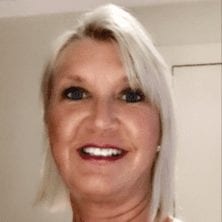
Cyndi Lago is a supply chain consultant and has helped large, complex organizations in multiple industries digitally transform supply chain operations in areas including demand planning, order management, master data management, and analytics. In prior roles, Cyndi helped some of the world’s largest consumer-products companies in their efforts to develop innovative solutions that realize business value through technology. Cyndi’s perspectives have appeared in numerous industry publications including Industry Week, Environmental Leader, Supply Chain World, and Apparel Magazine. Connect with Cyndi on LinkedIn.
